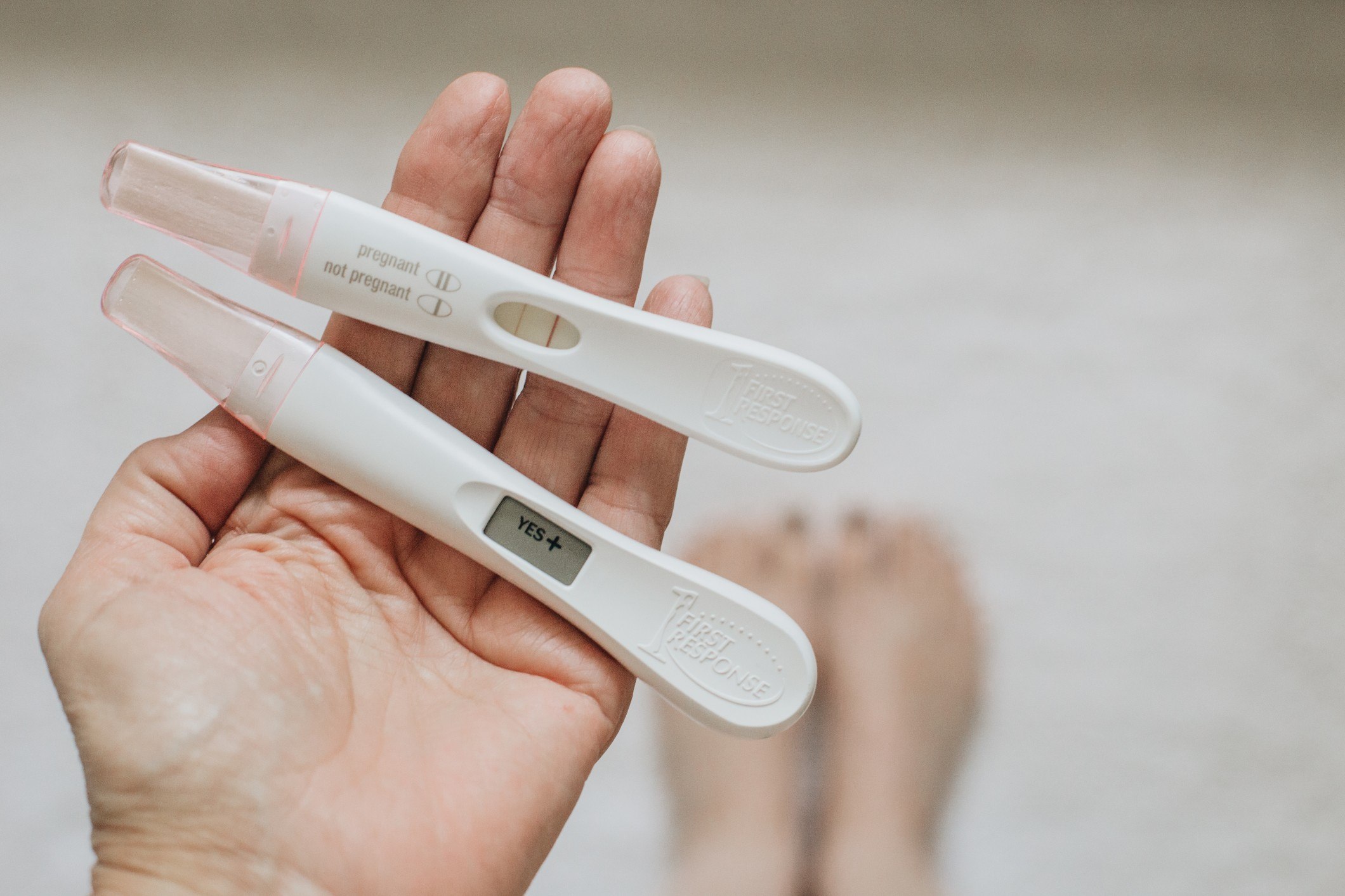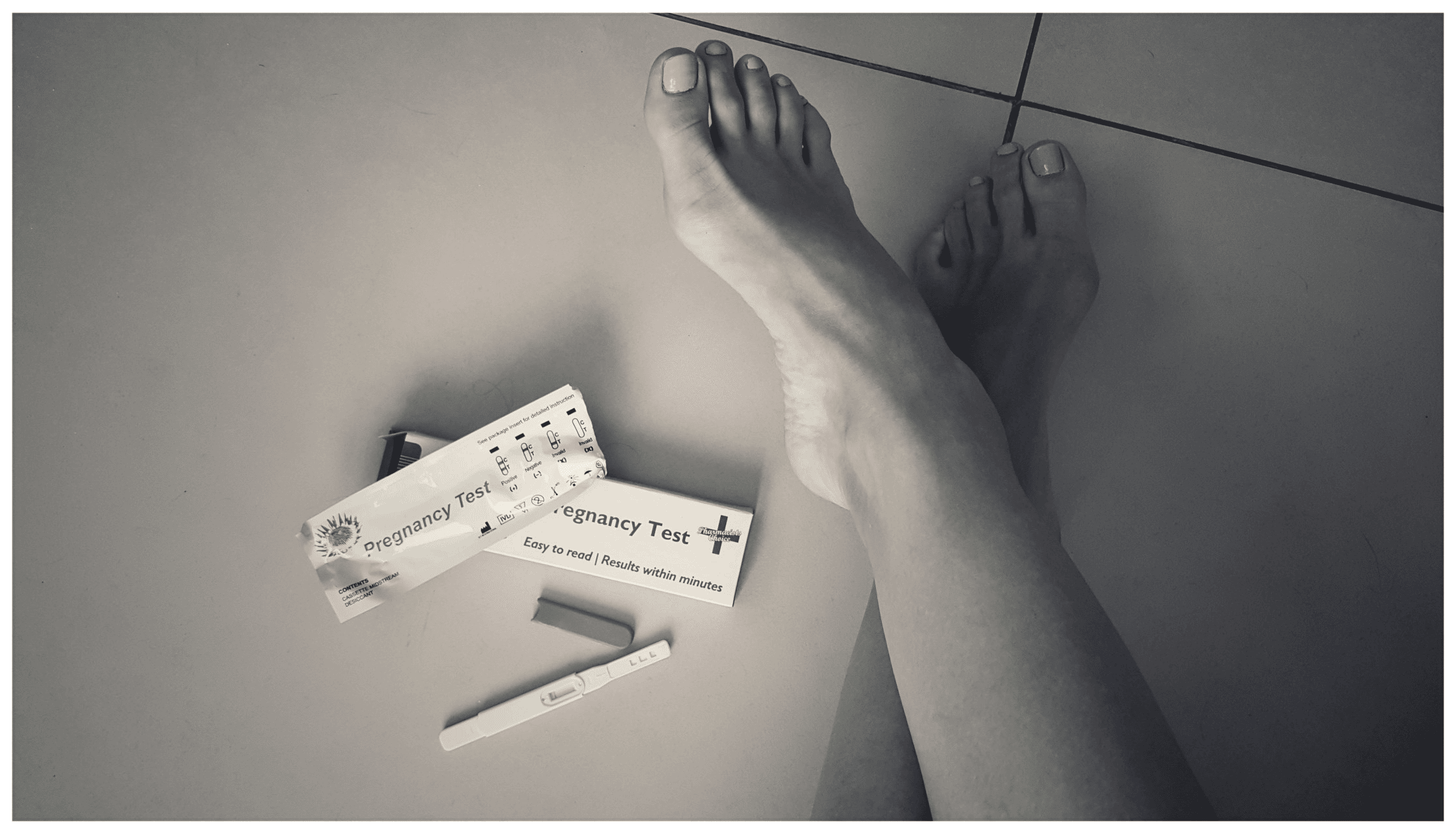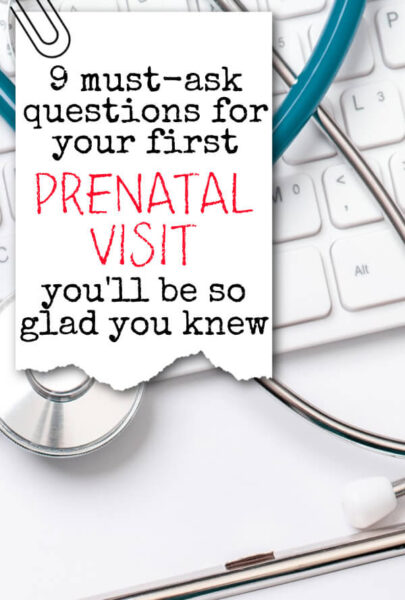

Should Your Husband Come to Your First Prenatal Visit? (Plus 8 Reasons Why!)
Pregnancy /
By Joshua Bartlett
- / Last Updated on May 17, 2023
Disclosure : Some of our articles contain links to recommended products or services in which we may receive a commission if you make a purchase.
At the beginning of your pregnancy, you may be filled with anxiety and plenty of questions. When you’re planning appointments for your pregnancy, you might wonder should your husband come to your first prenatal visit.
Your husband should come to your first prenatal visit and any other appointments if he’s able to. This allows your husband or partner to support you and learn more about what to expect throughout the pregnancy. When your husband is involved, the entire experience is easier for everyone.
Your husband or partner is going to be a huge part of your pregnancy every step of the way. Keep reading if you want to know more about how he can be a part of appointments and what to expect for your first prenatal visit.

Table of Contents
Should your husband come to your first prenatal visit?
Your first prenatal visit is both an exciting and scary experience, especially as a first-time mom. You may not know what to expect or what you should bring to your appointment. It will likely be comforting to you if your spouse comes along, but you might wonder if that’s normal.
50 years ago, you may not have seen a husband or partner at a prenatal visit. In fact, prior to the 1960s, dads weren’t even allowed in the delivery room. Many aspects of pregnancy and birth have changed since then, and it’s important for the father to be involved whenever possible.
Today, it’s perfectly normal for a husband or spouse to go with you to your prenatal visit and in most places it’s expected that you and your spouse come to appointments together. So should your husband come to your first prenatal visit during pregnancy? At the end of the day, it’s about what makes you the most comfortable.
In my experience, it’s best to always keep your partner involved and to communicate often throughout the pregnancy. Unless there is a reason why they can’t join you, always invite them to attend for support and mutual education.
When should your first pregnancy appointment be?
As soon as you get a positive pregnancy test, you may be anxious to make an appointment. However, you likely won’t have your first prenatal appointment until you’re well into the first trimester of pregnancy.
Typically, most midwives or physicians will schedule your first prenatal appointment no earlier than 8 weeks pregnant. However, it could be as late as 12 weeks. It’s around this time that you can hear baby’s heartbeat for the first time.
If your husband can’t make it to every appointment, the two most important appointments are usually the first appointment and the appointment for a prenatal ultrasound.
What to wear to first prenatal appointment
If you’re not sure what tests will be performed during your first prenatal appointment, you might wonder what you should wear . Your first ultrasound or sonogram on your belly likely won’t occur until later in your pregnancy. If they do perform an ultrasound during your first prenatal appointment, it will likely be a transvaginal ultrasound since it’s easier to see the baby this way during the early stages.
At your first prenatal appointment, you should dress comfortably. In some cases, they may have you have wear a gown if they’re doing a breast exam, PAP test, or ultrasound. Try not to wear tight clothing or clothing that would be difficult to remove.
Can I eat before my first prenatal visit?
Nutrition during pregnancy is incredibly important! You can eat before your first prenatal visit, and you should also drink plenty of fluids. Keep in mind, you will likely have to give a urine sample during your appointment, so try not to go to the bathroom right before your appointment.
The only time you may not be able to eat before your prenatal appointment is during your glucose test, but the glucose test usually happens after 20 weeks.
Why your husband should come to your first prenatal visit
At your first prenatal appointment , your doctor or midwife is going to give you a lot of information. This is why it’s so important for your husband or partner to be there with you.
A second set of ears and eyes can help if you have questions or concerns. Here’s a breakdown of 8 reasons why your husband or partner should be at your first prenatal visit:
Since you’re the one physically carrying the baby, it’s up to your husband to offer you support and help during the pregnancy. Their role in supporting you is essential during the entire pregnancy and postpartum period. The first way they can show their support is by coming to the first prenatal appointment with you.
Nervousness
Your first baby is both exciting and stressful, so you’ll likely be nervous for your first prenatal appointment. There may be a lot of emotions involved and that’s why you should have your husband or partner there with you . Knowing your husband is there with you can ease your nerves and help you stay calm.
The first heartbeat
Hearing your baby’s heartbeat for the first time is unbelievably exciting. This is the moment when the pregnancy may start to feel real, and there may be relief knowing your baby is okay. Your husband or partner won’t want to miss hearing your little one’s heartbeat for the first time.
What if something’s wrong?
The fear that comes along with the doctor telling you something isn’t right is gut-wrenching. It may be because they can’t quite find a heartbeat or may feel something out of the ordinary. Having your husband or partner there with you can help relieve your stress, calm you down, and have a word with the doctor in private if need be.
Second set of ears
There is so much information that will be thrown at you in a short amount of time. From physical health to what you should expect each trimester. It’s important to have a second set of ears there with you for when you may have questions in the future. Instead of calling your practitioner, you can simply ask your husband or partner if they remember what was said.
Decision making
You and your partner are in this together. You guys are a team and I can tell you, if my partner made a decision without me regarding our baby, I would be a little upset. If the doctor asks about the Down Syndrome test or any other test that could affect the baby, it should be talked about with your husband or partner.
Ultrasounds
If your husband or partner can’t make every single appointment, then they should aim for the ultrasound visits. These are amazing experiences that give you a glimpse of your baby in real-time. You can count its fingers and toes together, listen to its heartbeat together, and learn the gender of the baby together if that’s what you decide.
They won’t be clueless
If your husband or partner is with you at your appointments, they won’t be completely clueless when you’re talking about the weird stuff like the mucous plug, dilation, gestation, gestational diabetes, and other pregnancy things. At the appointments, they have a chance to ask questions about something they may not be 100% sure of.
What to expect at the first prenatal appointment
Your first prenatal appointment is exciting. If you also feel nervous, that’s perfectly normal. You will learn a lot of information vital to you and your baby’s health. That’s why it’s important to bring your husband or partner with you. Here are some of the things you can expect at your first prenatal visit:
At your first prenatal appointment, your baby’s due date will be determined right off the bat. Your healthcare provider will ask you the date of your last menstrual cycle was and will determine how far along you are from there. You may have an internal ultrasound between 12-13 weeks that will look for heartbeat and size. However, if you have irregular periods, this ultrasound may be sooner.
Your doctor may use a fetal doppler monitor to scan for your baby’s heartbeat if you’re at least 12-weeks weeks along. Sometimes, the heartbeat can be detected between 6-7 weeks if you have an internal ultrasound. If your doctor can’t find it, don’t panic. It’s normal for the heartbeat to be difficult to find early on in the pregnancy. This can happen for various reasons including:
- Date off by a few days
- Earlier than 12-weeks
- Bladder is too full
- Tilted uterus
- High body mass index
Having your husband or partner there with you can help ease the fear that may come from this normal occurrence.
Birth plans
At your first prenatal visit, you may ask about birth plans and your husband or partner may be interested in a birth plan as well. It’s essential to include your partner when deciding your preferences for birth. Not only should they know how to support you in your choices, but they should also be able to advocate for you if the need arises. Your birth plan should include the following:
- Pain medication or lack thereof
- Delayed cord-cutting
- Who is allowed to be in the room during the birth
- Skin-to-skin contact
- Breastfeeding
- Anything else that will make birth more comfortable for you
Physical exam
Your pregnancy is monitored in a number of ways throughout each trimester. At each visit, the doctor or midwife will measure your weight, height, and blood pressure.
While you may not have a complete physical at your first visit, you will be examined from head to toe within the first few visits. You will also have blood taken to measure your HGC levels, thyroid, sugar, and other levels.
Additionally, they may perform a Pap test, which is an internal swab that looks at your cervical cells for anything cancerous. They will also check your neck, heart, lungs, skin, and breasts.
Urine Specimen
This will happen at every appointment you go to. This allows your healthcare provider to check for sexually transmitted infections, such as chlamydia, and anything else abnormal in your pee.
Urine tests can also include proteins and glucose that could indicate pre-eclampsia or diabetes. It will also check for urinary tract infections and kidney infections.
First trimester screenings
Depending on where you live, you may be asked if you want to participate in a first-trimester screening. This will check to see if you are at risk of having a baby with Down Syndrome or other genetic complications. This includes a blood test and ultrasound done between 11 and 14 weeks.
If there are positive results from the first test, you’ve already had a pregnancy with positive results, or if you are over 40 when the baby comes, then you may be able to have a blood test done called non-invasive prenatal testing .
The non-invasive prenatal testing can be done as soon as 9-weeks. It may also provide additional genetic information about your baby’s risks.
Your healthcare provider will ask a lot of questions
In addition to everything else, you will also be asked lots of questions about your family history, mental health, and current lifestyle.
This is the area where your partner could really help you out. He knows more about his family’s history than you do and since your genes are mixed with his, it’s important to give your healthcare provider the most accurate information. Your doctor or midwife will ask various questions about past and present mental health.
Additionally, they will ask you about your diet, sexual activity, travel, and exercise routine. They will also stress the importance of prenatal vitamins and how to properly take them.
Should husband go to first ultrasound?
If your husband can’t make it to every prenatal appointment, that’s okay. But one of the most important appointments for them to be at is the first ultrasound. Not only will they want to be there to experience seeing your little one for the first time, it’s important for them to be there for support as well.
Do you usually get an ultrasound at your first prenatal visit?
You won’t necessarily get an ultrasound during your first prenatal appointment. If you do get an ultrasound, it will likely be an internal ultrasound instead of an abdominal ultrasound. Before 12 weeks, it can be difficult to see the baby through an external ultrasound.
Why is my first prenatal appointment so far away?
Depending on when you find out you’re pregnant, it may seem like your first prenatal appointment is really far away. You won’t usually be able to schedule your first appointment before 8 weeks, and sometimes it can be as late as 12 weeks. Healthcare care providers wait until you’re a little bit farther along so they can run any necessary tests and detect baby’s heartbeat.

My name is Joshua Bartlett I run this blog with my wife Jarah. We have more than 11 years of parenting experience including three girls and one boy. I started this blog in late 2018 when I realized that I was dealing with baby-related issues on a constant basis…please read more about me here !
Related Posts

This site is a participant in the Amazon Services LLC Associates Program, an affiliate advertising program designed to provide a means for sites to earn advertising fees by advertising and linking to Amazon.com. We are compensated for referring traffic and business to Amazon and other companies linked to on this site.
Copyright © 2023 Natural Baby Life
- Development
More Topics
- Poop and Pee
- Preparing for baby
- Privacy Policy
- Terms of Service
- Web Stories
- Shop our picks
- Meet our pediatrician

Resources for parents to get through the challenges.
Should Your Husband Come to Your First Prenatal Visit?

Finding out you’re pregnant is an exciting time, especially if it’s your first child. With all of that excitement can also come plenty of questions and anxiety about the nine months ahead.
From the changes to your body to the labor and delivery to eventually taking care of this new life, you have a lot on your plate.
This is why getting as much support as possible is so important. We’re not just talking about someone running out to get those foods you’ll be craving, although that is very helpful!
We’re talking about having the support of your husband or partner for your entire pregnancy journey. They probably have as many questions as you do which is why it’s a good idea to have them around for your doctor’s visits, including your first prenatal visit.
Your first prenatal visit is the beginning of what’s going to be a very exciting time with plenty of ups and downs. If you have someone along for the ride, it can make it easier and more enjoyable.
Let’s take a closer look at that first prenatal visit and how your husband can help.
In this article
Discover Your Due Date
Basic information, family history, urine specimen, you may get to hear the heartbeat, first trimester screenings, what questions should i ask, calm your nerves, you may hear the first heartbeat, someone else to listen, you’ll have someone there if there’s something wrong, he can hear the doctor’s firsthand, what happens during your first prenatal visit.
During your first prenatal visit, you’ll likely get a lot of information thrown at you. This appointment is generally around eight weeks after your last menstrual period.
It’s typically one of the longest visits so be prepared and be sure you have plenty of time blocked off on your schedule. You don’t want to feel rushed.
Here are several things to expect:
Your doctor will ask when your last menstrual cycle was to determine how far along you are. This will give them your due date.
While doctors do their best to pin down the date, we all know that babies have minds of their own. They can come earlier or later. Keep this in mind as your pregnancy progresses.
During your first prenatal visit your doctor will check your blood pressure, height, and weight. You can also expect a breast and cervical exam.
Since this is your first visit, your doctor will ask you questions about your medical history, allergies, any medications you’re taking, as well as any history of abortions or miscarriages.
You’ll also want to tell them about any hospitalizations you had in your past.
Family history will also be discussed so that your doctor can get the entire picture of your health and well-being.
You can also expect a trip to the lab for bloodwork. According to the American Pregnancy Association , several laboratory tests will be done, including:
- Hemoglobin/ hematocrit
- Rh Factor and blood type (if Rh negative, rescreen at 26-28 weeks)
- Rubella screen
- Varicella or history of chickenpox, rubella, and hepatitis vaccine
- Cystic Fibrosis screen
- Hepatitis B surface antigen
- Tay Sach’s screen
- Sickle Cell prep screen
- Hemoglobin levels
- Hematocrit levels
- Specific tests depending on the patient
If you’re unsure about any of the things that you’re being tested for, be sure to ask. Your doctor should be more than willing to discuss them with you.
Get used to peeing in a cup. It’s going to happen at every appointment. Your doctor is checking proteins and glucose that could indicate pre-eclampsia or diabetes.
Your doctor is also checking for urinary tract infections, kidney infections, and sexually transmitted diseases.
If you’re at least 12-weeks along your doctor may use a fetal doppler monitor to scan for your baby’s heartbeat. If you have an internal ultrasound, the heartbeat can be detected between 6-7 weeks.
Sometimes your doctor can’t find it which can be normal. This can happen if your due date is a few weeks off or if you’re earlier than 12 weeks. Also, your bladder may be too full.
If this is your first pregnancy, you may not be familiar with a birth plan. This is a roadmap that tells your doctor or midwife your wishes during birth.
Of course, things can happen and that plan may go out the window. But, having something in place is always a good idea.
Your birth plan can include topics like:
- Epidural or no epidural
- Who will be in the delivery room
- Delayed cord-cutting
- Breastfeeding
- Anything else you want to discuss labor and delivery
Your doctor may ask if you want to take part in a first-trimester screening. This will check to see if you’re at risk for having a baby with genetic complications or Down Syndrome.
If you decide you want this test, you will get a blood test and ultrasound done when you are 11-14 weeks.
That’s a lot of information to take in during just one visit. You’re likely going to have several questions you want to ask. It’s a good idea to jot some down ahead of time so that you don’t forget. Other ones will come up during your appointment.
Here are some common questions that women ask during their first prenatal visit:
- What is the schedule for my prenatal visits and ultrasounds?
- Do I need to change my diet, exercise routine, or normal habits?
- How do I know if I’m having complications?
- Is there a 24-hour number I can call with concerns?
- Can I travel?
- What happens if I start having bleeding or cramping?
- What kind of prenatal vitamins should I be taking?
- Should I stop taking my regular medications?
These are just a few ideas to get your wheels turning. Add any other questions that come to mind.
Reasons Why Your Husband Should Come to Your First Prenatal Visit

With all of the information you’ll be getting and questions you’re going to have, it just makes sense to have your husband with you on your first prenatal visit. Schedule it for a time that is convenient for both of you.
Here are several reasons why you’ll want your husband or partner by your side during your first prenatal visit.
You’re probably going to be nervous about this first visit. Having someone by your side to calm your nerves will help.
This is an emotional and amazing experience that you’re not going to want to miss and neither will your husband. Let him share this with you.
With so much going on it never hurts to have a second set of ears during your appointment. He may pick up on something you missed or remember something you forgot.
Unfortunately, there’s always the chance that something could be wrong. If there is, it’s comforting to have your husband there to calm you down.
While you would tell your husband as much about your visit as you remember, it’s best to have him there so he can hear everything firsthand. This way things don’t get lost in translation and he can also ask any questions that he has.
Many men these days will ask to come to the first prenatal visit, but even if your husband doesn’t, invite him along. You’re in this together.
You’ll need emotional support. The more he knows about the pregnancy, the more he’ll be able to help you. That’s something everyone can get on board with.

MomInformed is a participant in the Amazon Services LLC Associates Program, an affiliate advertising program designed to provide a means for us to earn fees by linking to Amazon.com and affiliated sites.
- Privacy Policy
© 2024 mominformed.com - All Rights Reserved
MomInformed.com is operated by Bon Ventures SRL, a registered company in Romania (Company No. 37394109), Str. Barbu Vacarescu 164A, Cladirea C1, 020285, Bucharest. Telephone +40 745 310 155
Your First Prenatal Appointment
Medical review policy, latest update:.
Medically reviewed for accuracy.
When should I schedule my first prenatal visit?
When will my first prenatal visit take place, read this next, how should i prepare for my first pregnancy appointment, what will happen at my first prenatal visit, will i see my baby on an ultrasound at my first prenatal visit, updates history, jump to your week of pregnancy, trending on what to expect, signs of labor, pregnancy calculator, ⚠️ you can't see this cool content because you have ad block enabled., top 1,000 baby girl names in the u.s., top 1,000 baby boy names in the u.s., braxton hicks contractions and false labor.
- Getting Pregnant
- Registry Builder
- Baby Products
- Birth Clubs
- See all in Community
- Ovulation Calculator
- How To Get Pregnant
- How To Get Pregnant Fast
- Ovulation Discharge
- Implantation Bleeding
- Ovulation Symptoms
- Pregnancy Symptoms
- Am I Pregnant?
- Pregnancy Tests
- See all in Getting Pregnant
- Due Date Calculator
- Pregnancy Week by Week
- Pregnant Sex
- Weight Gain Tracker
- Signs of Labor
- Morning Sickness
- COVID Vaccine and Pregnancy
- Fetal Weight Chart
- Fetal Development
- Pregnancy Discharge
- Find Out Baby Gender
- Chinese Gender Predictor
- See all in Pregnancy
- Baby Name Generator
- Top Baby Names 2023
- Top Baby Names 2024
- How to Pick a Baby Name
- Most Popular Baby Names
- Baby Names by Letter
- Gender Neutral Names
- Unique Boy Names
- Unique Girl Names
- Top baby names by year
- See all in Baby Names
- Baby Development
- Baby Feeding Guide
- Newborn Sleep
- When Babies Roll Over
- First-Year Baby Costs Calculator
- Postpartum Health
- Baby Poop Chart
- See all in Baby
- Average Weight & Height
- Autism Signs
- Child Growth Chart
- Night Terrors
- Moving from Crib to Bed
- Toddler Feeding Guide
- Potty Training
- Bathing and Grooming
- See all in Toddler
- Height Predictor
- Potty Training: Boys
- Potty training: Girls
- How Much Sleep? (Ages 3+)
- Ready for Preschool?
- Thumb-Sucking
- Gross Motor Skills
- Napping (Ages 2 to 3)
- See all in Child
- Photos: Rashes & Skin Conditions
- Symptom Checker
- Vaccine Scheduler
- Reducing a Fever
- Acetaminophen Dosage Chart
- Constipation in Babies
- Ear Infection Symptoms
- Head Lice 101
- See all in Health
- Second Pregnancy
- Daycare Costs
- Family Finance
- Stay-At-Home Parents
- Breastfeeding Positions
- See all in Family
- Baby Sleep Training
- Preparing For Baby
- My Custom Checklist
- My Registries
- Take the Quiz
- Best Baby Products
- Best Breast Pump
- Best Convertible Car Seat
- Best Infant Car Seat
- Best Baby Bottle
- Best Baby Monitor
- Best Stroller
- Best Diapers
- Best Baby Carrier
- Best Diaper Bag
- Best Highchair
- See all in Baby Products
- Why Pregnant Belly Feels Tight
- Early Signs of Twins
- Teas During Pregnancy
- Baby Head Circumference Chart
- How Many Months Pregnant Am I
- What is a Rainbow Baby
- Braxton Hicks Contractions
- HCG Levels By Week
- When to Take a Pregnancy Test
- Am I Pregnant
- Why is Poop Green
- Can Pregnant Women Eat Shrimp
- Insemination
- UTI During Pregnancy
- Vitamin D Drops
- Best Baby Forumla
- Postpartum Depression
- Low Progesterone During Pregnancy
- Baby Shower
- Baby Shower Games
What to expect at your first prenatal appointment
Your kickoff prenatal visit sets the stage for the rest of your pregnancy. Here's what to expect at this information-packed first appointment and how you can prepare.

When to schedule your first prenatal visit
When will your first appointment be, what happens at the first prenatal visit, how to prepare for your first prenatal appointment, what questions to ask at the first prenatal visit.
As soon as you get a positive result on a home pregnancy test , book an appointment with an obstetrician, family physician, or midwife . Depending on the practice, it's normal for another provider in the office, like a nurse practitioner or physician assistant, to handle your first visit.
If you haven't yet chosen a healthcare provider for your pregnancy, that's okay. It's still important to see someone now to start your prenatal care. You can always switch to another provider later.
Many healthcare providers will schedule your first visit for when you're about 8 weeks pregnant . Some will see you sooner, particularly if you have an existing health condition, had problems with a pregnancy in the past, or are having new or severe symptoms such as vaginal bleeding or abdominal pain .
If you're taking any medications or think you may have been exposed to a hazardous substance, let your provider know as soon as possible.
The first visit will probably be the longest of your prenatal appointments (unless you have complications with your pregnancy along the way). At this and all future visits, don't be afraid to raise any questions or concerns you've been wondering about – it helps to keep a running list between appointments.
Here's what your provider will likely do during your first prenatal visit.
Take your health history. Your provider will ask questions about your gynecological health, personal medical history, and lifestyle habits. Topics commonly covered include:
- Whether your menstrual cycles are regular and how long they tend to last
- The first day of your last period (to determine your due date )
- Symptoms or problems you've noticed since your last period, whether they're related to pregnancy or not
- Current or past gynecological conditions, including sexually transmitted infections
- Details about previous pregnancies
- Current or past diseases and conditions
- Past surgeries or hospitalizations
- Mental health difficulties and diagnoses
- Whether you are being or have been abused , or have another situation that could affect your safety or emotional well-being
- Smoking, drinking, and drug use
- Medications, supplements, vitamins, and herbal drugs you take
- Drug allergies
Your healthcare provider will also ask about your family medical history. Many genetic issues and birth defects are at least partly hereditary, so learning about your family history helps your medical team keep an eye out for potential issues. Let your provider know whether a relative in your or your partner's family has a chromosomal or genetic disorder, had developmental delays, or was born with a structural birth defect.
It's also important to mention any potential exposure to toxins, especially if you live or work near toxic materials.
Check you out and run some tests. You can expect a number of standard exams and tests at your first prenatal visit. Some healthcare providers will do an ultrasound , but if you don't have any medical problems or concerns, it may not be part of the routine. Here's what's typical:
- A thorough physical exam
- A pelvic exam, including a Pap smear (unless you've had one recently) to check for infections such as chlamydia and gonorrhea or abnormal cells that could indicate cervical cancer
- A urine sample to test for urinary tract infections and other conditions
Your provider will also order blood tests to:
- Identify your blood type and Rh status
- Look for anemia
- Check for HIV, syphilis, hepatitis B and, in certain cases, hepatitis C
- Determine immunity to rubella (German measles) and chickenpox
Discuss any high-risk pregnancy concerns. Many people are considered to have high-risk pregnancies , meaning there's a higher-than-average chance of health issues during pregnancy, labor, and birth. High-risk groups include those who:
- Become pregnant for the first time at age 35 or older
- Become pregnant for the first time before age 18
- Have certain medical issues that develop during pregnancy, such as preeclampsia and gestational diabetes
- Have certain preexisting health problems, such as high blood pressure , thyroid disease , or type 1 or type 2 diabetes
High-risk pregnancies need extra care. While many potential complications are treatable or temporary, some can be dangerous to both you and your baby. Your provider will talk through the risks at your first visit and throughout your pregnancy – and don't be afraid to ask questions at any point.
Explain your options for prenatal genetic testing. Your provider will offer you various prenatal screenings that can give you information about your baby's risk for birth defects and chromosomal conditions. These tests include:
- Noninvasive prenatal testing (NIPT) , also called cell-free fetal DNA testing. Performed at 9 weeks or later, it's used to examine the little bits of your baby's DNA present in your blood.
- A first trimester screen, also called a first-trimester combined test. Typically done between weeks 11 and 13, it consists of a blood test and a type of ultrasound called a nuchal translucency .
- A carrier screening if you haven't had one already. It's a simple blood or saliva test done to see whether your baby is at risk for any of 100 genetic disorders such as cystic fibrosis, sickle cell disease, thalassemia, and Tay-Sachs disease.
Finally, if you're high-risk, there are invasive genetic diagnostic tests that can tell you for sure whether your baby has Down syndrome or certain other conditions. These tests include chorionic villus sampling (CVS) , generally performed at 10 to 13 weeks, and amniocentesis , usually done at 16 to 20 weeks.
CVS and amniocentesis are invasive and may carry a small risk of miscarriage , so women who choose to have these procedures are usually those with a higher risk for genetic and chromosomal problems. Some moms-to-be choose to wait for the results of screening tests before deciding whether to have one of these diagnostic tests.
For more information, your provider can refer you to a genetic counselor .
Give you advice and let you know what's ahead. Your healthcare provider will give you information about eating well , foods to avoid , healthy weight gain , and prenatal vitamins . They'll also give you a heads-up about the common discomforts of early pregnancy and let you know which pregnancy symptoms require immediate attention .
Your emotional health is very important. Your provider may screen you for signs of depression during pregnancy . But don't wait to be asked. If you're feeling depressed or anxious, let your provider know so they can refer you to someone who can help.
The dangers of smoking , drinking alcohol, using drugs, and taking certain medications will be a topic of discussion, as well. If you need help quitting smoking or any other substance, your provider can recommend a program or counselor.
Other topics include the do's and don'ts of exercise , travel , and sex during pregnancy ; environmental and occupational hazards that can affect your baby; and how to avoid certain infections, such as toxoplasmosis . Your provider will also discuss recommended vaccinations , like the flu shot and the COVID-19 vaccine .
To help your visit go as smoothly as possible, try taking the following steps.
Review your medical history. Brush up on your health status so you can better answer questions. This includes information about your:
- Overall physical and mental health
- Current and past diseases, conditions and other health issues
- Current medications, including prescriptions, supplements, vitamins and herbal supplements and teas
- Fertility and pregnancy history
- Family medical history
- Partner's medical history
If possible, bring documentation along, such as immunization records or a list of your medications. You may even want to bring a baggie containing the medications themselves.
Take your partner, a family member, or friend. Another person can write down notes, ask questions, and provide emotional support during this information-dense first visit.
Get there on time or a little early. This can be helpful for filling out forms and reviewing your insurance. Make sure to bring your insurance information and cash or a credit card for any necessary co-pays.
Just as your provider will ask you questions at your first prenatal visit, it's a good idea to come prepared with a list of questions for your provider. Ask anything – and don't be shy. Again, try to keep a running list in the weeks before the appointment, so nothing important slips your mind.
Here are some questions to consider if your provider doesn't bring up the topic first.
- How much weight gain is healthy for me? The first prenatal visit is a great opportunity to learn about how your body will change. It's also a good time to ask about nutrition, including which foods to prioritize in your diet.
- What are the foods I should avoid ? Raw fish and unpasteurized cheeses are long-established no-no's for pregnant people, but ask your provider for a full list of what to skip, since the accepted wisdom has changed over the years. Ask about caffeine and alcohol, too. Coffee is typically alright in limited doses, but no amount of alcohol is considered safe when you're having a baby.
- Are prenatal supplements a good choice? Your provider will likely recommend a prenatal vitamin containing folic acid and iron, both of which are needed more during pregnancy.
- Can I exercise? What about sex? With some exceptions, both are usually okay when you're pregnant. They're important to discuss, however, since certain conditions may complicate matters.
- Is it safe to keep working? If you have a physically or emotionally demanding job , you may want to ask how you can ease the effects on your body and mind.
- Is travel okay? While planes, trains, and automobiles are typically safe well into pregnancy, people with particular complications may need to limit or avoid traveling.
- Which medications are safe to take? Ask about your current prescriptions, herbal products, teas, supplements, and any over-the-counter drugs you may use, such as pain relievers and cold medicines. Non-steroidal inflammatory drugs (NSAIDs) like ibuprofen and naproxen are not recommended, for example.
- What are common symptoms of pregnancy? Your provider can tell you what to expect and how to cope. Remember to ask what symptoms are uncommon, too, and what red flags to watch for.
- What should I do in an emergency? Find out who to contact and where to go if you begin to experience new, unusual, severe, or long-lasting symptoms.
- Who will treat me over the course of my pregnancy? If your provider is part of a group practice, you may see other members of the group during appointments. They may even deliver your baby.
- Do you recommend taking prenatal classes? Whether they're in a hospital, at a university, online, or somewhere else, prenatal classes can be invaluable learning experiences for parents-to-be. On top of the usual childbirth classes you hear about, you can also find courses in everything from stress management to good nutrition and even breastfeeding.
Last but not least, ask about your next visit and schedule the appointment before leaving the office. Until your 28th week of pregnancy, you'll likely see someone every four weeks or so.
You may also want to ask whether future visits will be in-person or virtual. Certain practices offer virtual visits for low-risk patients, those whose providers aren't close by, or even higher-risk patients that need to be evaluated more often.
Was this article helpful?
Prenatal visits: What to expect and how to prepare

What happens at second trimester prenatal appointments

NIPT (Noninvasive prenatal testing)

Chorionic villus sampling (CVS)

BabyCenter's editorial team is committed to providing the most helpful and trustworthy pregnancy and parenting information in the world. When creating and updating content, we rely on credible sources: respected health organizations, professional groups of doctors and other experts, and published studies in peer-reviewed journals. We believe you should always know the source of the information you're seeing. Learn more about our editorial and medical review policies .
March of Dimes. 2017. Prenatal Care Checkups. https://www.marchofdimes.org/pregnancy/prenatal-care-checkups.aspx Opens a new window [Accessed March 2024]
MedlinePlus. 2022. Prenatal care in your first trimester. https://medlineplus.gov/ency/patientinstructions/000544.htm Opens a new window [Accessed March 2024]
Mayo Clinic. 2022. Prenatal care: 1 st trimester visits. https://www.mayoclinic.org/healthy-lifestyle/pregnancy-week-by-week/in-depth/prenatal-care/art-20044882 Opens a new window [Accessed March 2024]
American Pregnancy Association. (2021). Your First Prenatal Visit. https://americanpregnancy.org/healthy-pregnancy/planning/first-prenatal-visit/ Opens a new window [Accessed March 2024]
Kids Health. 2022. Prenatal Visits: First Trimester. https://kidshealth.org/en/parents/tests-first-trimester.html Opens a new window [Accessed March 2024]
Mount Sinai. 2021. Prenatal care in your first trimester. https://www.mountsinai.org/health-library/selfcare-instructions/prenatal-care-in-your-first-trimester Opens a new window [Accessed January 2024]
Centers for Disease Control and Prevention. 2022. Recommended Clinician Timeline for Screening for Syphilis, HIV, HBV, HCV, Chlamydia, and Gonorrhea. https://www.cdc.gov/nchhstp/pregnancy/screening/clinician-timeline.html Opens a new window [Accessed March 2024]
Alabama Perinatal Excellence Collaborative. 2015. APEC Guidelines for Routine Prenatal Care. http://apecguidelines.org/wp-content/uploads/2016/07/Routine-Prenatal-Care-6-30-2015.pdf Opens a new window [Accessed March 2024]
Kids Health. 2019. Toxoplasmosis. https://kidshealth.org/en/parents/toxoplasmosis.html Opens a new window [Accessed March 2024]
NIH: Eunice Kennedy Shriver National Institute of Child Health and Human Development. 2017. What is a high-risk pregnancy? https://www.nichd.nih.gov/health/topics/pregnancy/conditioninfo/high-risk Opens a new window [Accessed March 2024]
Kids Health. 2022. What's a “High-Risk” Pregnancy? https://kidshealth.org/en/parents/high-risk.html Opens a new window [Accessed March 2024]
NIH: Eunice Kennedy Shriver National Institute of Child Health and Human Development. 2018. What are some factors that make a pregnancy high risk? https://www.nichd.nih.gov/health/topics/high-risk/conditioninfo/factors Opens a new window [Accessed March 2024]
March of Dimes. 2020. Prenatal Tests. https://www.marchofdimes.org/pregnancy/prenatal-tests.aspx Opens a new window [Accessed March 2024]
American College of Obstetricians and Gynecologists. 2022. Carrier Screening. https://www.acog.org/womens-health/faqs/carrier-screening Opens a new window [Accessed March 2024]
March of Dimes. 2020. Chorionic Villus Sampling. https://www.marchofdimes.org/pregnancy/chorionic-villus-sampling.aspx Opens a new window [Accessed March 2024]
Office on Women's Health. 2021. Prenatal care and tests. https://www.womenshealth.gov/pregnancy/youre-pregnant-now-what/prenatal-care-and-tests Opens a new window [Accessed March 2024]
MedlinePlus. 2021. What is noninvasive prenatal testing (NIPT) and what disorders can it screen for? https://medlineplus.gov/genetics/understanding/testing/nipt/ Opens a new window [Accessed March 2024]
Voyage Healthcare. 2021. Prenatal Care Overview. https://www.voyagehealthcare.com/how-to-make-the-most-of-your-first-prenatal-visit-guide Opens a new window [Accessed March 2024]
Gifford Health Care. Undated. Preparing for Your Appointment. https://giffordhealthcare.org/patients/preparing-for-your-appointment/ Opens a new window [Accessed March 2024]
Mayo Clinic. 2023. Pregnancy nutrition: Foods to avoid during pregnancy. https://www.mayoclinic.org/healthy-lifestyle/pregnancy-week-by-week/in-depth/pregnancy-nutrition/art-20043844 Opens a new window [Accessed March 2024]
American College of Obstetricians and Gynecologists. 2023. Nutrition During Pregnancy. https://www.acog.org/womens-health/faqs/nutrition-during-pregnancy Opens a new window [Accessed March 2024]
Mayo Clinic. 2022. Prenatal vitamins: Why they matter, how to choose. https://www.mayoclinic.org/healthy-lifestyle/pregnancy-week-by-week/in-depth/prenatal-vitamins/art-20046945 Opens a new window [Accessed March 2024]
American College of Obstetricians and Gynecologists. 2022. Exercise During Pregnancy. https://www.acog.org/womens-health/faqs/exercise-during-pregnancy Opens a new window [Accessed March 2024]
Mayo Clinic. 2022. Sex during pregnancy: What's OK, what's not. https://www.mayoclinic.org/healthy-lifestyle/pregnancy-week-by-week/in-depth/sex-during-pregnancy/art-20045318 Opens a new window [Accessed March 2024]
Kids Health. 2022. Sex During Pregnancy. https://kidshealth.org/en/parents/sex-pregnancy.html Opens a new window [Accessed March 2024]
American College of Obstetricians and Gynecologists. 2023. Travel During Pregnancy. https://www.acog.org/womens-health/faqs/travel-during-pregnancy Opens a new window [Accessed March 2024]
March of Dimes. 2020. Over-the-counter medicine, supplements and herbal products during pregnancy. https://www.marchofdimes.org/pregnancy/over-the-counter-medicine-supplements-and-herbal-products.aspx Opens a new window [Accessed March 2024]

Where to go next

- 45 Best Fatherhood Quotes (Funny, Inspirational, Daughters, Sons)
28 Hilarious Pregnancy Jokes (Funny, Witty, Dirty, Rude)
15 pregnancy tips & hacks for a safe & comfortable 9 months, 46 cute, funny & unique pregnancy announcement quotes.
- What Age Is Preschool? How To Decide If Your Child Is Ready
- Can You Eat Pepperoni While Pregnant? (Cooked, Cold, Pizza)
- 10 Best Alternatives To Coffee While Pregnant
- Can You Eat Potato Salad When Pregnant?
Should Your Husband Come To Your First Prenatal Visit?
At the start of your pregnancy it’s natural to feel both extremely excited and at the same time a little anxious.
With your first prenatal visit approaching, you are probably wondering if your husband or partner should come with you.
My answer and from my research is that there are several reasons why it is important for husbands to attend the first prenatal appointment.
These include the opportunity to learn about the pregnancy, ask any questions, offer you emotional support and share the wonderful experience of hearing your baby’s heartbeat for the first time.
Your husband or partner will be a big part of your pregnancy and you will no doubt want them with you each step of the way, so let’s take a look at prenatal visits in more detail.
Table of Contents
Is It Normal For Husbands To Attend Prenatal Visits?
What to expect at the first prenatal appointment, 1. emotional support, 2. experience hearing the baby’s heartbeat, 3. to learn, 4. ask questions, 5. remember things you might forget afterwards, 6. there in case something isn’t right, what to ask at first prenatal appointment.
A few decades ago you probably would have never seen men attend prenatal appointments.
Fortunately things have changed a lot since then, and nowadays it’s totally normal and acceptable for husbands and partners to attend the first prenatal appointment.
Personally I’m very glad times have changed, and really appreciated having my husband at these visits.
You’ll also find that in most cases health workers actually preferer them to be there, so they can hear about what will happen to their partner, listen to general pregnancy advice and be there to discuss any medical issues which may arise.
There is no doubt that your first prenatal appointment is an exciting and nervous time.
During these appointments there is a lot of information to take in (more on this later), which is why partners are encouraged to attend.
If you are not sure what to expect at the first prenatal appointment, here are a few things to expect :
- Check Up / Physical Exam: Similar to a general health exam where your weight, height and blood pressure may be measured.
- Confirm Pregnancy: A positive at home pregnancy test is a presumptive sign of pregnancy , meaning it’s not fully, 100% confirmed. A urine test or blood test will therefore be carried out in order to confirm the pregnancy.
- Other Tests: Apart from giving a urine specimen and / or a blood test, other tests that may be carried out include: genetic carrier screening, STD tests, pap smear and a blood sugar test.
- Due Date: This is often calculated by asking when your last menstrual cycle was.
- Heartbeat: A fetal doppler monitor will likely be used to scan for your baby’s heartbeat, assuming you are at least 12-weeks weeks along. As we covered before, this is why it’s recommended to wear a 2-piece outfit that is comfortable and loose-fitting when dressing for your prenatal appointment.
- Questions About You : Expect to talk about a range of topics including your medical history, lifestyle, diet, sexual activity and exercise routine. These are important questions so your practitioner can give you the best possible care.
Related: Your Complete Guide To A Happy & Healthy Pregnancy
6 Reasons Your Husband Should Come To First Prenatal Visit
Here are 6 reasons why you might want your husband to come with you to your first first prenatal appointment:
For many moms-to-be pregnancy is both an exciting and anxious time.
You don’t want your nerves to get the better of you and stop you from enjoying the special moment of hearing your baby’s heartbeat (see below) or asking any questions.
So having your man or partner there should help calm any jitters or anxiety and offer a shoulder to lean on should you need it.
Probably the most memorable part of your prenatal appointment will be hearing your baby’s heartbeat.
This is when you know your pregnancy is really happening and reinforces that you’re growing a tiny human inside you – a truly special moment that your husband or partner is not going to want to miss out on!
Let’s be honest, most men simply don’t know as much about pregnancy as women.
While this is quite natural given they aren’t the ones carrying the baby, attending your prenatal appointment is certainly a great way for husbands and partners to learn more about what you’re going through, and what you can expect over the coming months.
Prenatal appointments are the perfect chance for your partner to ask any questions, particularly as there’s a good chance that some of the information and terminology will be new to them.
You and your partner may also want to write down a list of questions beforehand, so your other half can refer to these during the visit and make sure they’ve been answered.
During your appointment you will probably discuss a lot of things with your healthcare worker.
Two sets of ears are clearly better than one, so from a practical point of view it’s a great idea for your husband or partner to be present, so they can hopefully remember anything that you may not have picked up on or are struggling to recall at a later date.
If your doctor unfortunately has to tell you something isn’t right then you’ll certainly want you husband there with you.
Perhaps they can’t find the heartbeat, which could happen if you’re earlier than 12 weeks, you have a full bladder or a high body mass index.
Or worse yet, you’re told that there is no baby – the words no expecting parents want to hear.
In these situations the support of your partner will be very comforting, so this alone is a reason why many moms-to-be want their partners with them at their first prenatal appointment.
The questions to ask at your prenatal appointment will often come down to your existing knowledge, whether you’ve had a baby before, and your personal medical conditions and circumstances.
If you’re not sure of the questions to ask, here are some standard things that a lot of moms-to-be find helpful to ask during a prenatal visit:
- What symptoms can I expect as my baby grows? (In addition to common pregnancy cravings )
- Are there specific symptoms I should tell you about if they occur?
- What types of foods should I eat? (For example protein is very important during pregnancy )
- What types of foods should I avoid? (Such as undercooked meat or dried foods like beef jerky )
- What type of exercise if safe ( backpacking , hiking , deadlifting , squatting , running, swimming etc)?
- Should I avoid any types of activities? (Such as getting a piercing, which isn’t safe for pregnancy women , swimming in cold water or getting a foot massage ).
- Do I need to take any supplements?
- Can I use a heat pad while I’m pregnant
- What medications should I avoid taking?
- How long can I expect morning sickness or vomiting to last?
- How Much Does A Midwife Cost & Do They Accept Insurance?
Tori is mama to 3 year old Isabella and co-founder of Rockinbaby. She has a BSc in Psychology, is a certified yoga teacher and is a working mom. In her free time Tori loves cooking delicious foods and baked treats, entertaining and working out. Learn more about Tori here .
Related Posts
10 things to do with your placenta after birth, why do i want to be pregnant so badly 5 possible reasons, 25 unexpected pregnancy announcement quotes, should you stop driving when pregnant, what to do on maternity leave: 15 fun & essential activities, 25 beautiful, uplifting & inspirational alone pregnancy quotes.
- Health & Wellbeing
- Food Checker
- Baby Showers
- Breast Feeding
- Physical & Emotional
- Tips & Hacks
- Middle Names
- First Names
Type above and press Enter to search. Press Esc to cancel.
Infertility
- Miscarriage & Loss
- Pre-Pregnancy Shopping Guides
- Diapering Essentials
- Bedtime & Bathtime
- Baby Clothing
- Health & Safety
- First Trimester
- Second Trimester
- Third Trimester
- Pregnancy Products
- Baby Names By Month
- Popular Baby Names
- Unique Baby Names
Labor & Delivery
- Birth Stories
- Fourth Trimester
- Parental Leave
- Postpartum Products
- Sleep Guides & Schedules
- Feeding Guides & Schedules
- Milestone Guides
- Learn & Play
- Beauty & Style Shopping Guides
- Meal Planning & Shopping
- Entertaining
- Personal Essays
- State of Motherhood
- Home Shopping Guides
- Work & Motherhood
- Family Finances & Budgeting
- Viral & Trending
- Celebrity News
- Women’s Health
- Children’s Health
- It’s Science
- Mental Health
- Health & Wellness Shopping Guide
- What To Read
- What To Watch
- Mother’s Day
- Memorial Day
- Summer prep
- Single Parenting
- Blended Families
- Community & Friendship
- Marriage & Partnerships
- Grandparents & Extended Families
- Stretch Mark Cream
- Pregnancy Pillows
- Maternity Pajamas
- Maternity Workout Clothes
- Compression Socks
- All Pregnancy Products
- Pikler Triangles
- Toddler Sleep Sacks
- Toddler Scooters
- Water Tables
- All Toddler Products
- Breastmilk Coolers
- Postpartum Pajamas
- Postpartum Underwear
- Postpartum Shapewear
- All Postpartum Products
- Kid Pajamas
- Play Couches
- Kids’ Backpacks
- Kids’ Bikes
- Kids’ Travel Gear
- All Child Products
- Baby Swaddles
- Eco-Friendly Diapers
- Baby Bathtubs
- All Baby Products
- Pregnancy-safe Skincare
- Diaper Bags
- Maternity Jeans
- Matching Family Swimwear
- Mama Necklaces
- All Beauty and Style Products
- All Classes
- Free Classes By Motherly
- Parenting & Family Topics
- Toddler Topics
- TTC & Pregnancy
- Wellness & Fitness
- Please wait..
9 essential questions to ask during your first prenatal visit
From 'Who will deliver me?' to 'Can I keep exercising?', write these down.
By Dr. Sarah Bjorkman Updated March 3, 2022

Aleksandar Nakic/Getty Images
You’re pregnant! You confirmed it with a ridiculous number of home pregnancy tests, started dreaming of baby names… and are wondering what to do next.
The first few weeks of your pregnancy can be one of the most exciting and overwhelming of your life, filled with a seemingly infinite number of questions . Take a deep breath, grab a pencil and write down some of those pressing questions, because you’ll want to have them with you at your first prenatal visit with your obstetrician or midwife .

The first prenatal visit usually happens between weeks 8 and 10, but it’s a good idea to let your provider know as soon as you find out you’re pregnant.
Here are the questions you should ask during your first prenatal appointment
1. Who will deliver me?
At your first visit, it’s a good idea to meet the doctors and midwives in the practice and to get a feel for their birth philosophy. The hospital they deliver at , the number of providers in the group and the options you have for your birth are important details you’ll want to know to help you decide whether the group is a good fit for you.
2. How much weight should I gain?
This depends on your pre-pregnancy weight. Your provider will calculate your BMI to help guide the discussion about healthy weight gain during pregnancy, though remember that these are just guidelines—not prescriptive parameters. As a general rule, women at a healthy weight should gain between 25 and 30 pounds, women who are underweight should gain nearly 40 pounds and women who are overweight or obese should gain 11 to 20 pounds during their pregnancy.
3. Can I continue exercising?
If you have a pre-pregnancy regimen you enjoy, your doctor will likely advise you to continue. If you do not yet have an exercise regimen , they will probably encourage you to start one! Exercise helps maintain appropriate weight gain during pregnancy, and some studies have shown that it may decrease your risk for gestational diabetes, preeclampsia and cesarean delivery.
4. What should I do about my history with certain health conditions?
One of the most important things to talk with your provider about during your first prenatal visit is your health history. Pregnancy is generally a state of wellness, but can put great stress on your body, exacerbating certain health conditions. Some common conditions that affect pregnancy include diabetes, high blood pressure, seizures, hypo- and hyperthyroidism and depression, but be sure to tell your OB about any health issues you’ve had, as special medical adjustments may be necessary. Also let them know about any surgeries you’ve had or any problems with antibiotics or anesthesia.
5. Are all my medications safe for pregnancy?
Take a list of all the medications, herbs and supplements you are currently taking to your appointment. Some medications can cause birth defects or could negatively affect your pregnancy, so your provider may have you stop or change what you’re taking.
6. Should I be taking a prenatal vitamin ?
Yes! While it’s best to start taking prenatal vitamins prior to conception, it’s never too late to start. Ask your doctor whether there is a prenatal vitamin they recommend or whether they know of one that’s covered by your insurance.
7. What type of genetic screening should I get?
There are many different options for genetic screening that your doctor can offer you. These are based on how far along you are in your pregnancy and what risk factors you have. Your doctor should be able to outline all the tests available to you—just be sure to clarify which ones are covered by your insurance.
8. Should I get a Covid vaccine?
Yes. A growing body of research shows that pregnant women with Covid symptoms are 40% more likely to deliver their babies prematurely and are at least two to three times more likely to be admitted to the ICU with severe symptoms than non-pregnant people. All major U.S. health organizations and maternal-fetal associations strongly urge pregnant women or those thinking about becoming pregnant to get vaccinated against Covid. Studies also show that getting the Covid vaccine in pregnancy can provide your newborn with protection against the virus . Be sure to talk to your doctor about this, too.
9. Who should I call if I have questions or concerns?
Most practices have a phone number where a nurse or provider can be reached 24 hours a day if you have questions or concerns, or if you think you’re in labor. This is important, because babies tend to not respect business hours, so make sure you have the after-hours emergency number before you leave.
If your first prenatal visit flies by and you happen to forget a question or two, don’t worry. You’ll see your provider many more times before your due date and should have lots of opportunities to ask more questions.
The Initial Consultation – What to Expect?
At your first prenatal visit, typically scheduled around the eighth week of pregnancy, your healthcare provider will gather a thorough medical history, conduct a physical examination, and perform necessary laboratory tests. This first consultation serves as an essential opportunity to discuss any concerns, clarify doubts, and receive crucial advice on maintaining a healthy pregnancy .
Understanding Your Estimated Due Date
The first question that pops up in most expectant mothers’ minds is, “ When is my baby due? “. While there are numerous apps and online calculators that can estimate your due date based on your last menstrual period, ovulation date, or conception date, these tools may not be 100% accurate. Your healthcare provider can provide a more precise estimated due date based on your last menstrual period and a dating ultrasound. Although only a small percentage of women deliver on their actual due date, knowing it can help track milestones and schedule necessary tests and appointments.
Navigating Dietary Changes and Supplements
During pregnancy, your body undergoes significant changes, and your dietary needs adjust accordingly. One crucial query to raise during your first prenatal visit pertains to food – “ What should I be eating more of, and what should I avoid? “. Your healthcare provider will provide personalized advice based on your current health status, dietary habits, and specific needs during pregnancy.
Moreover, you should also discuss the necessary supplements required during pregnancy. Prenatal vitamins, DHA, and sometimes additional supplements like iron tablets are commonly recommended.
Gaining Insight into Pregnancy Symptoms
Each pregnancy is unique, and so are the symptoms that accompany it. While some women may experience prominent signs right from the early weeks, others might go through their first trimester with minimal discomfort. It is beneficial to ask your healthcare provider about what symptoms you can expect during your pregnancy and how to manage them effectively.
Monitoring Weight Gain
A healthy weight gain is integral to a healthy pregnancy. However, the amount and rate of weight gain can vary greatly among women. It is influenced by factors such as your pre-pregnancy body mass index (BMI), number of babies you’re carrying, and any underlying health conditions. Therefore, asking about the recommended weight gain for your specific situation is a crucial question to pose at your first prenatal visit.
Frequently Asked Questions
What questions do they ask at your first prenatal appointment.
Expect questions about your health history, your menstrual cycle, and any past pregnancies. Your provider wants to understand your health and any risks to your pregnancy. They’ll ask about medications, lifestyle, and family health history too.
How do I prepare for my first prenatal appointment?
Gather any health records, write down all your medications, and think about questions you have. Note down the first day of your last period. Bring any previous pregnancy records. Feeling prepared will help you make the most of your visit.
What questions will a woman be asked during her prenatal visits?
Questions will vary but often include how you’re feeling, any symptoms you’re experiencing, and questions about your lifestyle. Be honest to help your provider support you best.
Should my husband come to my first prenatal visit?
If possible, yes! It’s a great way for your partner to be involved and understand the pregnancy journey. Plus, they can provide support and remember information.
What happens at your first OB appointment?
Your first OB appointment may include a physical exam, blood tests, and discussing your health history. It’s a time to ask questions and understand your pregnancy better.
Is 12 weeks too late for the first prenatal visit?
While earlier visits are ideal, a first visit at 12 weeks can still provide essential care. Inform your healthcare provider as soon as possible and schedule an appointment.
Will I see my baby on an ultrasound at my first prenatal visit?
Sometimes, but not always. Ultrasounds are often part of the initial appointment but can vary based on your healthcare provider’s practice and your pregnancy’s specifics.
How long should your first prenatal visit be?
First visits are usually longer than later ones, often lasting an hour. This gives you and your provider enough time to cover all necessary ground.
Does the first prenatal visit include an ultrasound?
It can, but this varies. Some providers perform an ultrasound to confirm the pregnancy and estimate the due date. Ask your provider what to expect.
Haven’t taken a birth class yet, mama? We created the perfect one for you—and we’ll guide you through everything you need to know. Sign up for Motherly’s birth class here .
A version of this story was originally published on April 18, 2020. It has been updated.
When you’re just about to become a mama, you need all the nurturing you can get. Discover the supportive products in the Motherly Shop.
Digital classes from motherly.

The Motherly Birth Class
Support for the entire birth experience, from preparation to postpartum.

Hypnobirthing made simple
How to plan for your best birth with power and serenity

introduction to Cesarean section births
One in three births are C-sections, and it’s important to be empowered about this (beautiful) type of birth. We will walk you through planned and unplanned C-sections and will share tools that can help with your recovery
Related Stories

Pregnant? Here are some surprising facts about each trimester

It’s the first trimester! Here’s what to do + learn

Women's Health
I’m a nutritionist: here are my favorite prenatal vitamins to recommend, our editors also recommend....

30 baby names inspired by the total solar eclipse

Words of encouragement when IVF doesn’t work—from someone who is there, too

Getting Pregnant
29 inspiring quotes to remember when trying to conceive.

Am I in labor? 5 early signs of labor to know about

Costs of Giving Birth in April 2024
Prepping for Your First Prenatal Visit? Ask Your Doc These Questions

Table of Contents
Questions about your body and your health, questions about your doctor & delivery.
Early pregnancy often feels very abstract—all you have to show for it are two pink lines on a stick . Once you call your doctor’s office to tell them you’re pregnant (the receptionist is probably the first person you’ll tell besides your partner), they probably won’t have you come in until you’re somewhere between seven and ten weeks along. This is to ensure your appointment is far enough along to hear a heartbeat, but it also means you’ll have a lot of time to prep for that exciting and nerve-wracking first prenatal appointment, where it all starts to feel a little more real.
So how do you prepare for your first prenatal appointment? There’s not a ton you need to do, but there are a few things that will help ensure it goes as smoothly as possible. First, think about when your last period started—your pregnancy begins on the first day of your last period (so for the first two-ish weeks of your official pregnancy, you actually aren’t pregnant—weird).
You’ll also want to inventory any medications or supplements you take and think about anything from your medical history that may not be clearly outlined in your chart. For example, maybe your mom gave birth prematurely, you have irregular periods, or you’ve had a previous chemical pregnancy. But most of all, you’ll want to prep some questions to ask at your first prenatal visit. While your mind is spinning with excitement and your growing to-do list, we’re here to help you check off that last box.
You don’t need to ask all of these questions at your first appointment—you can pick and choose which are most relevant to you and decide what you need to know now versus what can wait for your next appointment. But it’s good to look over all of them, so you can be prepared to get answers, especially for things that are non-negotiables for you. For example, if you’re hoping for a VBAC (vaginal birth after cesarean) and your doctor or hospital is hesitant to do them, it’s probably time to look for a new provider. And the earlier you can do that, the better.
Read on for a comprehensive look at the questions you may want to consider asking at your first prenatal appointment, whether it’s your first pregnancy or your fifth.
How should I think about my exercise routine during my pregnancy?
If your doctor so far has been Google, you will know that there are conflicting takes about basically every type of exercise and pregnancy . ( No hot yoga during pregnancy! But do all the exercise you normally do! ). So, it’s helpful to get a medical professional’s insight on how much you should be exercising and how your routine should or shouldn’t change.
What should I know about sex during pregnancy?
Your doctor’s advice may change by trimester, but it’s good to start having the conversation early. They’ll probably tell you anything goes (as long as you’re comfortable), but in cases where there’s a history of certain conditions like placental issues or pre-term labor, your doctor may want you to exercise caution or abstain (sorry!).
Based on my medical history, does it appear that I’m at risk for any complications?
It’s better to have all the information you need upfront, right? For example, certain things like having frequent migraines, diabetes, or polycystic ovary syndrome may put you at an increased risk of preeclampsia 1 . Your doctor will be able to give you the broad strokes during this first visit of what you should and—even more importantly—shouldn’t worry about based on your history.
How long can I travel? And can I go on an international trip?
I had to reschedule a trip to Mexico when I was pregnant with my son because my doctor felt it was planned for a time that was too late in my pregnancy. I’m very glad I asked at that first appointment and had plenty of time to make changes.
What symptoms are not considered normal and warrant an immediate call to your office?
Many women (myself included) will have the urge to call their doctor over every little cramp and twinge. While you should feel empowered to ask your doctor anything and everything, there are some pregnancy symptoms they will definitely want you to contact them about, like bleeding or pain. They can also give you guidelines on the things you might experience that could cause you concern, especially if this is your first, but that are perfectly normal during pregnancy.
What medicine can I take?
You may be surprised by which medications are pregnancy-safe and which are not. You can (and probably should) Google before you take any medication, but the internet can be a confusing place, so it’s good to have a doctor’s sign-off, especially on any regular meds you take.
What foods do I really need to avoid? What is okay in moderation?
If you’re like me, you’ll have lots of questions like, “I know sushi is generally a ‘no,’ but what if it’s from a high-quality restaurant? And do I really need to give up Brie?” Your doctor will be able to give you guidelines on the foods that could put you and your baby at risk of listeria or toxoplasmosis (aka definitely don’t eat), and the ones that are on the avoid list, but that, if they do make you sick, will be no worse for you than it would be if you weren’t pregnant.
What beauty products should I steer clear of?
Sorry, but your retinol will probably have to take a backseat. Your doctor will explain any skincare ingredients to avoid and sneaky places they may be hiding.
Can I clean a litter box? Garden? Dye my hair?
There are a variety of activities that everyone talks about avoiding during pregnancy. Take a look at your normal habits and ask your doctor about anything that you’re concerned about. They can give you guidelines on what you do and don’t need to change.
What is your stance on the occasional drink?
If you survey your parent friends, you’ll probably find that some completely avoided alcohol for all 40 weeks, while others had an occasional beer or glass of wine later in pregnancy. (French women, yada yada). Depending on how by the book your doctor is, they may give you the ACOG answer 2 (there is no safe amount of alcohol during pregnancy) or something a little more nuanced about how it’s impossible to study alcohol and pregnancy, so they don’t know for sure. Either way, it’s a good idea to get their opinion before you make the decision that’s right for you.
What are weight gain expectations for this pregnancy? Does it change if I didn’t shed all the weight from the first pregnancy?
Your doctor will be able to address all your questions about weight and pregnancy, including any complications associated with gaining too little or too much. The first appointment is a good time to set expectations for future conversations about weight, whether it’s not wanting to know the number on the scale (something I’m really glad I asked for) or opting out of weight checks altogether.
What can I do for constipation and hemorrhoids?
Just trust me, you’re going to want to know.
What do you recommend I do to prepare for birth?
Sure, this is your first appointment, but it’s never too early to start getting ready for the big day. Your doctor may recommend specific books, exercises, Instagram accounts they like, or even a doula or birth class. It’s a good idea to start figuring out your options early so that you have plenty of time to do the birth-prep exercises or start interviewing doulas.
What is the best way for me to contact you with non-urgent questions?
You’re going to have a lot of questions, and not all of them need to be answered right away. Does your doctor like to be messaged through the patient portal? Would they prefer you leave a message with the receptionist? How long should you expect to wait to get an answer? And what should you do for urgent questions?
Does your doctor have any travel planned?
Now’s the time to find out if your doctor has an African safari planned around your due date. If they do have vacation or extended time off on the calendar during your pregnancy, it’s important to know who you’ll see instead and what the practice’s plans are for coverage.
Who will deliver my baby if you are not on call?
So much of having a good birth experience is feeling comfortable with your team. For that reason, it can be nice to get to know the other doctors in the practice who could potentially deliver your baby or at least familiarize yourself with who it could be.
How much past 40 weeks will you allow me to go?
Doctors have many different stances on how long past 40 weeks they’ll allow patients to go, so this question is important to ask. Some research shows 3 that inducing after 41 weeks lowers the risk of stillbirth and other complications, like meconium aspiration (when babies breathe in their waste). Some will insist on inducing earlier than 41 weeks, and some may let you go up to 42 weeks. It’s good to know their policy regardless, but if you have a specific preference, you will want to make sure your doctor’s policies are in alignment.
What is your policy on _______?
Pick and choose the questions on policies that are meaningful for you here. Some doctors, for example, are not trained on instrument-assisted deliveries, so in the event that you would need one (if you fatigue from pushing or the baby is in distress), you’d instead have an emergency C-section. (I did not think to ask this question myself, but I will if I have future pregnancies, as my son was born assisted by vacuum when his heart rate began to drop). Some situations to consider asking about:
Scheduled c-sections
Pain management
Episiotomies
Intermittent vs continuous monitoring
Instrument-assisted deliveries (forceps or vacuum)
VBACs (This will only be relevant to you if you’ve previously had one or more caesareans and are hoping for a vaginal delivery)
What is the cadence of my appointments?
Your ob-gyn practice may set up all your appointments, or at least all of them through 20 weeks, at that very first prenatal appointment. Generally, you’ll go monthly up until about 28 weeks, then every other week until 36 weeks when you begin weekly appointments. But this is a good time to let the office know if a certain day or time doesn’t work for you and how they handle scheduling.
Want evidence-based health & wellness advice for fertility, pregnancy, and postpartum delivered to your inbox?
Your privacy is important to us. By subscribing you agree to our Privacy Policy and Terms & Conditions . This site is protected by reCAPTCHA and the Google Privacy Policy and Terms of Service apply.
Expectful uses only high-quality sources, including academic research institutions, medical associations, and subject matter experts.
National Institutes of Health . " Who is at risk of preeclampsia? " , https://www.nichd.nih.gov/health/topics/preeclampsia/conditioninfo/risk#:~:text=Preeclampsia%20is%20also%20more%20common,diabetes%2C%20and%20sickle%20cell%20disease. .
The American College of Obstetrics and Gynecologists . " Alcohol and Pregnancy " , https://www.acog.org/womens-health/infographics/alcohol-and-pregnancy .
Institute for Quality and Efficiency in Health Care . " Pregnancy and birth: When does labor need to be induced? " , Sep 24, 2008 , https://www.ncbi.nlm.nih.gov/books/NBK279570/#:~:text=In%20other%20words%3A%20The%20research,aspiration%20(breathing%20in%20meconium). .
Grace Gallagher, MFA, Hunter College
Grace Gallagher is a freelance writer based in Portland, Oregon. Her work focuses on parenting, health, and beauty and has appeared in Parents, Romper, Pregnancy & Newborn, Shape, InStyle, and more.
Related Articles

The Ultimate Checklist of Prenatal Vitamins & Supplements

Sonogram vs. Ultrasound: What’s the Difference?


An OB-GYN Answers All Your Questions About Prenatal Vitamins

Everything You Need To Know About Amniotic Fluid

Everything You Need to Know About Amniotic Fluid

The Big Reveal: Your 20-Week Anatomy Scan Explained
Get the newsletter.
Evidence-based health and wellness resources for fertility, pregnancy and postpartum.

9 Questions You Must Ask At Your First Prenatal Visit
By: Author Doug Penta MD OB/GYN
Categories PREGNANCY , 9 Must-Ask Questions At Your First Prenatal Visit

Updated October 25, 2023
“Your first prenatal visit is a blend of understanding and celebration. It’s where we gather insights about your health, establish a foundation for the journey ahead, and most importantly, ensure that both you and your baby are on a path to wellness. Remember, every question is valid, every emotion is understood, and you’re never alone in this journey. We’re here to support, guide, and cherish these moments with you.” – Dr. Doug Penta, MD, OB/GYN
These 9 questions are based on our 25 years of clinical experience managing prenatal patients from their first prenatal visit until delivery.
The following list is simply a list of the questions from this article and is only a few of the many questions you may have for your healthcare provider.
Write the questions down as you will surely have questions specific to your medical history.
- Who will deliver my baby when I go into labor?
- If I require urgent care, where will I be seen, and who will evaluate me if my provider is not available?
- Do the providers in your practice manage labor from home or is there always one provider present at the hospital?
- How is anesthesia coverage managed at the hospital affiliated with your medical practice?
- At my prenatal visit, can I book more than one appointment at a time so I can see my personal prenatal care provider?
- How do you manage patients with an overdue pregnancy?
- What is the level of nursery at the hospital affiliated with your practice?
- How do the providers in your practice feel about pain control during labor and delivery?
- What childbirth preparation classes do you recommend to your patients?

The questions are intended to be topics that will help educate and initiate a conversation with your prenatal care provider and are not all-inclusive.
There are many other very important questions you will have, based on your particular desires and expectations.
Asking these questions at the start of your prenatal care is very important.
You want to know if your prenatal care provider has any fundamental differences in beliefs or expectations about your prenatal care, labor, and delivery.
It will be comforting to know the answers to these questions as your pregnancy advances.

(Couple at a prenatal visit.)
Table of Contents
1. Who will deliver my baby when I go into labor?
Every women’s health medical practice caring for prenatal patients has a labor and delivery schedule arranged months in advance.
This schedule indicates what medical group provider, will be managing labor patients in labor and delivery 24/7/365.
This schedule is usually made 3 to 6 months in advance, to avoid any scheduling conflicts.
There are also medical practices that have doctors who only cover patients in labor and delivery.
These physicians are called laborists .
This role was created to improve the continuity of care for patients in the hospital.
When you go into labor, you will be managed by the doctor covering labor and delivery based on the call schedule discussed above.
It is not physically possible nor safe for one doctor to cover labor and delivery 24 hours a day, every day.
There are a few clinical situations where you would be more likely to be delivered by your doctor:
- If you are having an induction, your doctor may schedule it when on cal l at the hospital.
- Scheduled repeat cesarean section. (If you know at your first prenatal appointment that you are going to want a repeat cesarean section, discuss this at your first visit.)
2. If I require urgent care during my pregnancy, where will I be seen, and who will evaluate me if my provider is not available?
The answer to this question differs a great deal from one medical practice to another.
Before you choose a provider, you will want to find out how the medical practice cares for patients when the office is closed and what facilities (if any) are available when it comes to managing problems after office hours.
Questions that will help determine who will manage your care after hours are the following:
- What is the size of the medical practice? How many doctors in the medical group?
- Do the group of physicians in the medical practice manage labor and delivery at one hospital?
- Is the practice part of a larger network of physicians who manage patients at more than one hospital?
- Does the medical practice have an urgent-care facility to evaluate labor patients before sending patients to the hospital? A medical practice such as Kaiser Permanente has urgent care facilities to evaluate patients after office hours.
- How many doctors in the medical practice manage labor patients in the hospital?
Once you know the answers to the questions above, you will have a far better idea of how you will be managed for non-scheduled medical visits.
Since you may be managed by another doctor in your medical group, it is a good idea to schedule a prenatal visit with each of the doctors in the practice that may cover your labor and delivery. This will ensure that you will have at least meet the doctor delivering your baby before the onset of labor. -Dr. Doug Penta, MD
3. Do the providers in your practice manage labor from home or is there always one provider present at the hospital?
There are very few medical practices that cover labor and delivery from home. This was not uncommon years ago.
However, now that most medical practices have three or more doctors, more patients are managed by one medical practice. This means there will be more patients in labor at any given time.
Some medical practices and hospitals now employ laborists.
These doctors only cover patients in labor and delivery.
4. How is anesthesia coverage managed at the hospital affiliated with your medical practice?
- It is important to know how the anesthesia department covers patients in labor at the facility where you plan to deliver.
- This is important to know even if you are not planning on using pain medication during labor.
- Should you need urgent intervention during your labor, anesthesia will be necessary
- Anesthesiologists are employed by the hospital. The way the anesthesia staff cover labor and delivery will vary depending on the hospital where you plan to deliver.
- A level one hospital will have a different coverage arrangement compared to a tertiary care hospital that has 24/7 in-house anesthesia coverage at all times. Tertiary care hospitals are most often teaching hospitals and trauma centers. Most often they have to have a full complement of medical staff in the hospital at all times.
- This means from medical students to residents to attending physicians to fellows, these hospitals have a full obstetric anesthesia staff as illustrated in our article on 20 hospital questions.
5. At my prenatal visit, can I book more than one appointment at a time so I can see my personal prenatal care provider?
Many women want to schedule more than one prenatal visit at a time to get an appointment time that fits into their work schedule and is with their personal provider.
Though many offices will book appointments far out, some will not.
Take the time to ask this question if you feel this will impact your daily routine.
Especially since there are many routine prenatal visits during your pregnancy.
6. How do you manage patients with an overdue pregnancy?
Doctors and patients often have a difference in opinion about how to manage a pregnancy that goes past the due date.

First, it is important to mention the terms that are used to describe this situation.
Most people will use the terms “overdue pregnancy” or a “pregnancy that has gone past the due date”.
In the medical field, the term used to describe a past-due pregnancy depends on how many days over the due date.
Making this distinction is important because it will determine what management is necessary:
Late-term pregnancy : 41 – 41 6/7 weeks
Post-term pregnancy : 42 weeks and beyond
There are basically two approaches to the management of pregnancies that do not deliver by 41 weeks:
1. Induction:
Inducing labor is based on a number of clinical criteria.
This intervention can be done electively to prevent complications associated with a late-term or post-term pregnancy.
Inducing labor is also done immediately (non-electively) if delivery is necessary because of a pregnancy complication or abnormal fetal testing during expectant management (#2)
2. Expectant management:
Expectant management involves the clinical observation and monitoring of a late-term pregnancy until the onset of spontaneous labor.
Monitoring includes antenatal testing (fetal testing) to monitor fetal well-being. (The problem with this approach is that antenatal testing is not 100% reliable when it comes to assessing fetal well-being.)
In either situation, the decision to proceed with the induction of labor is done if there are concerns about infant morbidity and mortality or maternal concerns of morbidity and mortality.
Assuming a pregnancy is uncomplicated there is no disagreement about allowing a pregnancy to go one week past its due date or to 41 weeks gestation.
In fact, the majority of pregnancies will deliver within one week before or after the scheduled due date.
At 41 completed weeks of pregnancy is when decisions about delivery are made.
Balancing the risk of induction versus the risk of fetal morbidity or mortality.
- It has been well established that the function of the placenta starts to deteriorate during the weeks following delivery. A term used to describe this process is uteroplacental insufficiency . When this happens there can be decreased blood flow and oxygen delivery to the fetus.
Induction of labor will be decided upon by your provider based on a number of factors and options that are within the standard of medical care:
- Inducibility of cervix: A cervix that is inducible based on a cervical exam can lead to more successful induction of labor.
- Maternal health conditions : high blood pressure (toxemia, etc.)
- Completed weeks of pregnancy
- Fetal testing findings
- Provider’s preferred management approach (assuming there are options).
Management decisions cannot be generalized as there are a number of factors (above) that need to be considered to determine the best treatment option.
*Complying with the accepted standards of medical care is the one factor that must be part of any plan of management.
7. What is the level of nursery at the hospital affiliated with your practice?

Knowing the level of nursery at the hospital where you plan to deliver is extremely important.
The care can range from a Level I (Well Baby Nursery) to a Level II (Special Care Nursery) to a Level III or Neonatal intensive care unit (NICU).
The NICU was first established in the 1960s by the American Academy of Pediatrics to manage babies with critical medical problems requiring prolonged life support.
The level of the nursery essentially correlates with the level of the hospital. Hospitals range from primary to secondary to tertiary care facilities.
Typically, tertiary care hospitals are teaching hospitals and are equipped to handle trauma and advanced medical care.
If you have a medical illness or a pregnancy-related complication that could affect the health of your baby, it is important to know what level of neonatal care is available at the hospital where you deliver.

8. How do the providers in your practice feel about pain control during labor and delivery?

Many women choose a doctor for their pregnancy based on a mutual understanding and agreement on pain management during labor.
The choices for pain control during labor cover a broad spectrum:
- Strongly desiring to go through natural childbirth without the use of medication during labor.
- Want an epidural for pain management as soon as it can be administered? When an epidural can be administered is based on criteria that have been defined and comply with the standards of medical care.
- For women who are not sure if they will want IV pain medication or an epidural, the decision can be managed during labor. It is not a problem to change your mind about pain management, as long as there is adequate time to administer alternative therapies. You do not want to delay your decision too long. Epidurals take time to administer, so it is important to decide well before you are fully dilated and imminently going to deliver.
When deciding on pain control during labor, it is very important to plan ahead as best you can.
Most importantly, be prepared to accept the possibility that your pain management during labor might deviate from your birth plan.
The two most common reasons are a personal desire for pain control and the need for regional anesthesia (spinal or epidural) if a cesarean section is necessary.
Some of the clinical guidelines that have to be met before epidural placement include:
- Confirmation that you are in labor , best defined as contractions with cervical change.
- Cervical dilatation … which you will want to discuss with your provider. Some medical practitioners and medical facilities are fine with giving an epidural as long as you are in labor, even if you are in early (latent) labor. Other doctors may want to wait until cervical dilatation has reached 3 cm.
- No history of medical conditions that could interfere with the safe placement of an epidural catheter . Two such conditions include bleeding disorders or a history of severe back injuries.
The doctors in a medical group share hospital coverage to manage patients in labor.
Try to arrange prenatal visits with the other doctors so you can ask questions and know that they are in agreement with your labor plan.
Solo practitioners who managed everything during your prenatal care and delivery (with rare exceptions) no longer exist.
This is a result of the advances that have been made in the management of pregnancy, the costly overhead of running a practice, and the number of patients that have been determined to be safe for one practitioner to care for.
This is why it is crucial to know the questions you must ask at the first prenatal visit.
So you will want to discuss your philosophy and wishes about pain control.
Be sure to ask questions. There is a lot of misinformation that circulates online.

(Woman with an epidural self-administering a dose of pain medication.)
While you certainly don’t need to have any type of birth plan thought out at your first prenatal visit, it isn’t a bad idea to at least consider how you see your future labor and delivery experience unfolding.
You can check out our post on developing a stress-free birth plan for some questions you might want to consider about the birth process.
9. What childbirth preparation classes do you recommend to your patients?
Many couples have specific requests when it comes to their pregnancy and birth plans.
It is not unusual for expectant parents and their prenatal care providers to disagree on management options.
This is often the result of a difference in philosophies or expectations about the childbirth experience. What is most important is that the management that is agreed upon is within the standards of medical care.
This question is addressed in detail in our post Are Childbirth Classes Necessary?
Other pregnancy-related articles you may find helpful are the following:
- 5 Must-Know Tips For Scheduling Prenatal Visits
- 10 Tips To Fight Fatigue During Pregnancy
- Maternity Hospital Tour: 20 Important Questions You Should Ask
FAQ’s
1. should my husband come to my first prenatal visit.
Dr. Doug Penta, MD, OB/GYN with over 38 years of experience and a father of two: “Absolutely, if he can and if you both feel comfortable with it. The first prenatal visit is a milestone, and having your partner there can be a great support. Not only will he get firsthand information about the pregnancy, but it also provides an opportunity for him to ask questions, understand the process, and be an active participant from the get-go. It can foster a feeling of shared responsibility and excitement about the journey ahead.”
Sue Winters, RN, and mom who had her husband attend her first prenatal visit: “For us, having my husband there was a game-changer. It made the experience feel even more real and shared. He was able to ask questions that I hadn’t thought of, and it was reassuring for both of us to hear the answers together. Plus, there’s something so special about experiencing those initial moments as a team. It truly set the tone for our pregnancy.”
2. What blood tests were done at my first prenatal appointment?
The initial panel of blood work, done at your first prenatal has been evolving over many years.
Testing will continue to evolve, as tests are identified that can help to screen for medical and developmental concerns during pregnancy.
As of this moment, a typical blood work screen at your initial prenatal visit will include the following:
- Blood Type and Rh Factor (ABO blood group and if Rh + or -). Even if you know your blood type you will still be checked for a number of medical reasons.
- Hepatitis B Screening
- Rubella Screening
- VDRL (Syphyllis screening)
- Thyroid Screening (This is a newer addition to the bloodwork panel because of the impact undiagnosed under or over-thyroid activity can have on fetal development.
- HIV screening if consented to.
- Genetic testing depends on a risk profile such as an inherited condition or ethnic-related genetic disorder.
- Blood count
- Metabolic panel
- Urine test for routine urinalysis
What happens at your first prenatal visit?
According to Dr. Douglas Penta, MD, your first prenatal visit is a significant step in your pregnancy journey. It’s an opportunity to establish a health baseline, get answers to any questions, and set the tone for your prenatal care.
Here’s a breakdown of what typically happens:
- Medical History Review : Your healthcare provider will ask about your personal and family medical history, including previous pregnancies, surgeries, medications, and any chronic conditions. This helps identify potential risk factors or concerns.
- Physical Examination : This includes checking your weight, blood pressure, heart, lungs, and sometimes a breast and pelvic exam. The pelvic exam allows the doctor to determine the size of your uterus and may also include a Pap smear if you’re due for one.
- Calculation of Due Date : Based on the first day of your last menstrual period (LMP) and sometimes supplemented by ultrasound, your provider will estimate your due date.
- Determine your blood type and Rh factor.
- Check for anemia.
- Screen for infections such as rubella, syphilis, hepatitis B, HIV, and others.
- Check for immunity to certain diseases.
- Screen for urinary tract infections or kidney problems.
- Discussion of Lifestyle Habits : Expect to discuss topics like nutrition, exercise, medications, and any potential harmful habits like smoking, alcohol, or drug use.
- Ultrasound : Some healthcare providers might conduct an ultrasound during the first visit, especially if there are uncertainties about the pregnancy timeline or concerns about the pregnancy.
- Prenatal Vitamins : If you’re not already on prenatal vitamins, your provider will likely recommend starting them. These vitamins contain essential nutrients, including folic acid, which is crucial during early pregnancy.
- Questions and Concerns : Your provider should allocate time to answer any questions or concerns you might have, whether they’re about symptoms, what’s to come, birthing plans, or anything else on your mind.
- Scheduling Future Appointments : Your next prenatal visits will be discussed, and you’ll likely leave with a schedule or an idea of how often you should be seen.
- Counseling : Depending on your medical history, age, or other factors, you might be offered genetic counseling or screening tests to assess the risk of genetic disorders
Make sure you address any questions or concerns you have about COVID-19.
The information about coronavirus testing and how it is managed during pregnancy is constantly being updated as data becomes available from the CDC .

Dr. Doug Penta, MD - Co-Founder of Maternity Comfort Solutions Dr. Doug Penta, is a seasoned Obstetrician and Gynecologist with over 38 years of practice, co-founded Maternity Comfort Solutions to provide evidence-based pregnancy and parenting information. A Boston University alum and former Clinical Professor at Harvard, his articles on Maternity Comfort Solutions offer expectant mothers invaluable nutritional insights.
View all posts

Sue Winters, RN - Co-Founder of Maternity Comfort Solutions Sue combines 20 years of nursing with a rich background in early childhood education. Co-founder of Maternity Comfort Solutions, her articles provide creative toddler activities and practical tips on pregnancy nutrition and baby shower planning, embodying her commitment to supporting families through early parenthood.
This site uses Akismet to reduce spam. Learn how your comment data is processed .

- Pregnancy Classes

Your First Prenatal Visit
If you did not meet with your health care provider before you were pregnant, your first prenatal visit will generally be around 8 weeks after your LMP (last menstrual period ). If this applies to you, you should schedule a prenatal visit as soon as you know you are pregnant!
Even if you are not a first-time mother, prenatal visits are still important since every pregnancy is different. This initial visit will probably be one of the longest. It will be helpful if you arrive prepared with vital dates and information. This is also a good opportunity to bring a list of questions that you and your partner have about your pregnancy, prenatal care, and birth options.
What to Expect at Your First Pregnancy Appointment
Your doctor will ask for your medical history, including:.
- Medical and/or psychosocial problems
- Blood pressure, height, and weight
- Breast and cervical exam
- Date of your last menstrual period (an accurate LMP is helpful when determining gestational age and due date)
- Birth control methods
- History of abortions and/or miscarriages
- Hospitalizations
- Medications you are taking
- Medication allergies
- Your family’s medical history
Your healthcare provider will also perform a physical exam which will include a pap smear , cervical cultures, and possibly an ultrasound if there is a question about how far along you are or if you are experiencing any bleeding or cramping .
Blood will be drawn and several laboratory tests will also be done, including:
- Hemoglobin/ hematocrit
- Rh Factor and blood type (if Rh negative, rescreen at 26-28 weeks)
- Rubella screen
- Varicella or history of chickenpox, rubella, and hepatitis vaccine
- Cystic Fibrosis screen
- Hepatitis B surface antigen
- Tay Sach’s screen
- Sickle Cell prep screen
- Hemoglobin levels
- Hematocrit levels
- Specific tests depending on the patient, such as testing for tuberculosis and Hepatitis C
Your healthcare provider will probably want to discuss:
- Recommendations concerning dental care , cats, raw meat, fish, and gardening
- Fevers and medications
- Environmental hazards
- Travel limitations
- Miscarriage precautions
- Prenatal vitamins , supplements, herbs
- Diet , exercise , nutrition , weight gain
- Physician/ midwife rotation in the office
Possible questions to ask your provider during your prenatal appointment:
- Is there a nurse line that I can call if I have questions?
- If I experience bleeding or cramping, do I call you or your nurse?
- What do you consider an emergency?
- Will I need to change my habits regarding sex, exercise, nutrition?
- When will my next prenatal visit be scheduled?
- What type of testing do you recommend and when are they to be done? (In case you want to do research the tests to decide if you want them or not.)
If you have not yet discussed labor and delivery issues with your doctor, this is a good time. This helps reduce the chance of surprises when labor arrives. Some questions to ask include:
- What are your thoughts about natural childbirth ?
- What situations would warrant a Cesarean ?
- What situations would warrant an episiotomy ?
- How long past my expected due date will I be allowed to go before intervening?
- What is your policy on labor induction?
Want to Learn More?
- Sign up for our weekly email newsletter
- Bonding With Your Baby: Making the Most of the First Six Weeks
- 7 Common Discomforts of Pregnancy
BLOG CATEGORIES
- Can I get pregnant if… ? 3
- Child Adoption 19
- Fertility 54
- Pregnancy Loss 11
- Breastfeeding 29
- Changes In Your Body 5
- Cord Blood 4
- Genetic Disorders & Birth Defects 17
- Health & Nutrition 2
- Is it Safe While Pregnant 54
- Labor and Birth 65
- Multiple Births 10
- Planning and Preparing 24
- Pregnancy Complications 68
- Pregnancy Concerns 62
- Pregnancy Health and Wellness 149
- Pregnancy Products & Tests 8
- Pregnancy Supplements & Medications 14
- The First Year 41
- Week by Week Newsletter 40
- Your Developing Baby 16
- Options for Unplanned Pregnancy 18
- Paternity Tests 2
- Pregnancy Symptoms 5
- Prenatal Testing 16
- The Bumpy Truth Blog 7
- Uncategorized 4
- Abstinence 3
- Birth Control Pills, Patches & Devices 21
- Women's Health 34
- Thank You for Your Donation
- Unplanned Pregnancy
- Getting Pregnant
- Healthy Pregnancy
- Privacy Policy
Share this post:
Similar post.

Leg Cramps During Pregnancy

Prenatal Vitamin Limits

Skin Changes During Pregnancy
Track your baby’s development, subscribe to our week-by-week pregnancy newsletter.
- The Bumpy Truth Blog
- Fertility Products Resource Guide
Pregnancy Tools
- Ovulation Calendar
- Baby Names Directory
- Pregnancy Due Date Calculator
- Pregnancy Quiz
Pregnancy Journeys
- Partner With Us
- Corporate Sponsors
Your first prenatal appointment: What to expect
The first prenatal visit is one of the longest appointments a woman will have during pregnancy, with several tests and a lot of important information conveyed..
During pregnancy, you need regular prenatal visits to keep yourself and the pregnancy healthy. These visits are called prenatal care appointments. In these visits, you might meet with an OB/Gyn, a midwife or a nurse practitioner.
During pregnancy, you'll meet with your prenatal care provider every four weeks until you are about 28 weeks (7 months) pregnant. After that, you'll come every two weeks. Then, in your last month of pregnancy, we'll want to see you weekly.
Your first appointment will likely be the longest of the many prenatal visits to come. At that visit, we will discuss your overall health, answer your first round of questions and help you prepare for the next nine months.
Most women make an appointment after they get a positive result from a home pregnancy test. Often, this is one or two weeks after a missed period. Call us at 505-272-2245 , and we will schedule your first prenatal appointment between six and eight weeks of pregnancy.
What to Expect
Confirming the pregnancy.
Sometimes, home pregnancy tests give false positives—it says you are pregnant, but you aren't. And unfortunately, approximately one in four pregnancies ends in miscarriage , often early in pregnancy. Before we do any other tests, we'll first confirm your pregnancy with a urine test and blood draw.
Estimating Your Due Date
We’ll also ask about your periods:
- How old you were when they started
- How regular they are
- When your last period started
This information helps us estimate your due date—when we expect the baby to come. The due date is approximately nine months from the first day of your last period.
We’ll also discuss whether you want to continue with the pregnancy. Nearly half of all pregnancies in the U.S. are unplanned. It’s OK to not immediately know how you feel about being pregnant, or what you want to do. At your first prenatal visit, we can talk you through your options . We will support you in whatever you decide.
Personal and Family Medical History
Be prepared to discuss your personal and family medical history. This information helps us determine whether the embryo might be at risk for health problems.
Some of the topics we'll discuss include:
- Alcohol, tobacco and caffeine use
- Chronic conditions, such as diabetes and high blood pressure
- Exposure to potentially toxic substances
- Genetic disorders
- Medications, including supplements and over-the-counter drugs
- Past surgeries
- Pregnancy complications
- Travel to countries where infectious diseases—such as Zika virus or malaria—are common
At your first visit, we'll also discuss social concerns, such as whether you feel safe at home and at work. Your employer is required to give you accommodations if your job is unsafe for pregnancy. If you don’t feel safe, we can discuss options to manage that situation.
You’ll also get a battery of tests to examine the health of you and your baby. These can include blood and urine tests to look for:
- Blood type and Rh status to determine if you are Rh negative, which can affect the pregnancy
- Glucose levels
- Immunity to measles and chickenpox
- Infections such as rubella, hepatitis B and C, syphilis and HIV
- Urinary tract infections, gonorrhea and chlamydia
Depending on your age and health history, your may also be offered an optional blood test called noninvasive prenatal testing (NIPT) . This screening can be done as early as nine weeks and can determine whether the embryo may be at risk for genetic conditions such as:
- Down syndrome (trisomy 21)
- Edward’s syndrome (trisomy 18)
- Patau syndrome (trisomy 13)
Physical Exam
We’ll check your vitals such as blood pressure and calculate your body mass index to determine how much weight you should gain during pregnancy. We’ll also do a head-to-toe physical exam that may include a breast exam, pelvic exam and screenings of your heart, lungs and thyroid. If you’re due for a Pap smear to check for cervical cancer, we can also do that test at the first visit. We may also try to find out how big your uterus is and if this corresponds to how many weeks pregnant you think you are. We can usually hear fetal heart tones with a doppler after 10 weeks.
Getting an ultrasound at your first prenatal appointment is not required. But we do them more often than not. The ultrasound helps narrow down your due date and confirms that the pregnancy is in the uterus. We also may be able to hear the heartbeat at this time and see if you’re having than one baby.
However, if you’re hoping to learn whether you’re having a boy or girl, you'll have to wait a bit longer! The baby won't be that apparent on ultrasound until approximately 20 weeks.
Education and Resources
Education is a big part of prenatal care. All patients who deliver at UNM Hospital get access to:
- Managing pregnancy symptoms: Some early pregnancy body changes are weird, but normal. These include tender, swollen breasts, fatigue or nausea and vomiting. We can discuss how to manage these symptoms and when to see your doctor.
- Prenatal vitamins: It’s important to take prenatal vitamins with folic acid to prevent neural tube defects and walk you through some foods to avoid—such as alcohol, unpasteurized cheeses, deli meats, and raw fish. We also can suggest exercises that are safe to do during pregnancy .
- Drug and alcohol support: During pregnancy, it's important to quit drinking, smoking and using drugs. If you need help to quit, we can recommend pregnancy-safe medications and options. For example, our Milagro Clinic is designed specifically to give pregnant patients safe, respectful addiction care.
- Prenatal classes: From new parent classes to childbirth classes , we offer a range of in-person and Zoom classes to help you prepare for parenting.
- Financial assistance: There are financial programs at UNM Hospital and in the community to help families with no or limited health insurance.
- Home visits: We can connect you to programs for first time moms that offer home visits at no charge to families with new babies. At these visits, we'll answer your questions and help troubleshoot feeding concerns.
Your first prenatal appointment might seem a bit overwhelming. But we are here for you. We will give you all the information you need to have a healthy pregnancy. And we’ll be by your side, all the way.
Get Expert OB/Gyn Care
Visit the UNM Women's Health site to browse our services. Learn More .
Contact for Members of the Press
Chris Ramirez (505) 313-3429 [email protected]
Appointments at Mayo Clinic
- Pregnancy week by week
Prenatal care: 1st trimester visits
Pregnancy and prenatal care go hand in hand. During the first trimester, prenatal care includes blood tests, a physical exam, conversations about lifestyle and more.
Prenatal care is an important part of a healthy pregnancy. Whether you choose a family physician, obstetrician, midwife or group prenatal care, here's what to expect during the first few prenatal appointments.
The 1st visit
When you find out you're pregnant, make your first prenatal appointment. Set aside time for the first visit to go over your medical history and talk about any risk factors for pregnancy problems that you may have.
Medical history
Your health care provider might ask about:
- Your menstrual cycle, gynecological history and any past pregnancies
- Your personal and family medical history
- Exposure to anything that could be toxic
- Medications you take, including prescription and over-the-counter medications, vitamins or supplements
- Your lifestyle, including your use of tobacco, alcohol, caffeine and recreational drugs
- Travel to areas where malaria, tuberculosis, Zika virus, mpox — also called monkeypox — or other infectious diseases are common
Share information about sensitive issues, such as domestic abuse or past drug use, too. This will help your health care provider take the best care of you — and your baby.
Your due date is not a prediction of when you will have your baby. It's simply the date that you will be 40 weeks pregnant. Few people give birth on their due dates. Still, establishing your due date — or estimated date of delivery — is important. It allows your health care provider to monitor your baby's growth and the progress of your pregnancy. Your due date also helps with scheduling tests and procedures, so they are done at the right time.
To estimate your due date, your health care provider will use the date your last period started, add seven days and count back three months. The due date will be about 40 weeks from the first day of your last period. Your health care provider can use a fetal ultrasound to help confirm the date. Typically, if the due date calculated with your last period and the due date calculated with an early ultrasound differ by more than seven days, the ultrasound is used to set the due date.
Physical exam
To find out how much weight you need to gain for a healthy pregnancy, your health care provider will measure your weight and height and calculate your body mass index.
Your health care provider might do a physical exam, including a breast exam and a pelvic exam. You might need a Pap test, depending on how long it's been since your last Pap test. Depending on your situation, you may need exams of your heart, lungs and thyroid.
At your first prenatal visit, blood tests might be done to:
- Check your blood type. This includes your Rh status. Rh factor is an inherited trait that refers to a protein found on the surface of red blood cells. Your pregnancy might need special care if you're Rh negative and your baby's father is Rh positive.
- Measure your hemoglobin. Hemoglobin is an iron-rich protein found in red blood cells that allows the cells to carry oxygen from your lungs to other parts of your body. Hemoglobin also carries carbon dioxide from other parts of your body to your lungs so that it can be exhaled. Low hemoglobin or a low level of red blood cells is a sign of anemia. Anemia can make you feel very tired, and it may affect your pregnancy.
- Check immunity to certain infections. This typically includes rubella and chickenpox (varicella) — unless proof of vaccination or natural immunity is documented in your medical history.
- Detect exposure to other infections. Your health care provider will suggest blood tests to detect infections such as hepatitis B, syphilis, gonorrhea, chlamydia and HIV , the virus that causes AIDS . A urine sample might also be tested for signs of a bladder or urinary tract infection.
Tests for fetal concerns
Prenatal tests can provide valuable information about your baby's health. Your health care provider will typically offer a variety of prenatal genetic screening tests. They may include ultrasound or blood tests to check for certain fetal genetic problems, such as Down syndrome.
Lifestyle issues
Your health care provider might discuss the importance of nutrition and prenatal vitamins. Ask about exercise, sex, dental care, vaccinations and travel during pregnancy, as well as other lifestyle issues. You might also talk about your work environment and the use of medications during pregnancy. If you smoke, ask your health care provider for suggestions to help you quit.
Discomforts of pregnancy
You might notice changes in your body early in your pregnancy. Your breasts might be tender and swollen. Nausea with or without vomiting (morning sickness) is also common. Talk to your health care provider if your morning sickness is severe.
Other 1st trimester visits
Your next prenatal visits — often scheduled about every four weeks during the first trimester — might be shorter than the first. Near the end of the first trimester — by about 12 to 14 weeks of pregnancy — you might be able to hear your baby's heartbeat with a small device, called a Doppler, that bounces sound waves off your baby's heart. Your health care provider may offer a first trimester ultrasound, too.
Your prenatal appointments are an ideal time to discuss questions you have. During your first visit, find out how to reach your health care team between appointments in case concerns come up. Knowing help is available can offer peace of mind.
There is a problem with information submitted for this request. Review/update the information highlighted below and resubmit the form.
From Mayo Clinic to your inbox
Sign up for free and stay up to date on research advancements, health tips, current health topics, and expertise on managing health. Click here for an email preview.
Error Email field is required
Error Include a valid email address
To provide you with the most relevant and helpful information, and understand which information is beneficial, we may combine your email and website usage information with other information we have about you. If you are a Mayo Clinic patient, this could include protected health information. If we combine this information with your protected health information, we will treat all of that information as protected health information and will only use or disclose that information as set forth in our notice of privacy practices. You may opt-out of email communications at any time by clicking on the unsubscribe link in the e-mail.
Thank you for subscribing!
You'll soon start receiving the latest Mayo Clinic health information you requested in your inbox.
Sorry something went wrong with your subscription
Please, try again in a couple of minutes
- Lockwood CJ, et al. Prenatal care: Initial assessment. https://www.uptodate.com/contents/search. Accessed July 9, 2018.
- Prenatal care and tests. Office on Women's Health. https://www.womenshealth.gov/pregnancy/youre-pregnant-now-what/prenatal-care-and-tests. Accessed July 9, 2018.
- Cunningham FG, et al., eds. Prenatal care. In: Williams Obstetrics. 25th ed. New York, N.Y.: McGraw-Hill Education; 2018. https://www.accessmedicine.mhmedical.com. Accessed July 9, 2018.
- Lockwood CJ, et al. Prenatal care: Second and third trimesters. https://www.uptodate.com/contents/search. Accessed July 9, 2018.
- WHO recommendations on antenatal care for a positive pregnancy experience. World Health Organization. http://www.who.int/reproductivehealth/publications/maternal_perinatal_health/anc-positive-pregnancy-experience/en/. Accessed July 9, 2018.
- Bastian LA, et al. Clinical manifestations and early diagnosis of pregnancy. https://www.uptodate.com/contents/search. Accessed July 9, 2018.
Products and Services
- A Book: Obstetricks
- A Book: Mayo Clinic Guide to a Healthy Pregnancy
- 1st trimester pregnancy
- Can birth control pills cause birth defects?
- Fetal development: The 1st trimester
- Implantation bleeding
- Nausea during pregnancy
- Pregnancy due date calculator
Mayo Clinic does not endorse companies or products. Advertising revenue supports our not-for-profit mission.
- Opportunities
Mayo Clinic Press
Check out these best-sellers and special offers on books and newsletters from Mayo Clinic Press .
- Mayo Clinic on Incontinence - Mayo Clinic Press Mayo Clinic on Incontinence
- The Essential Diabetes Book - Mayo Clinic Press The Essential Diabetes Book
- Mayo Clinic on Hearing and Balance - Mayo Clinic Press Mayo Clinic on Hearing and Balance
- FREE Mayo Clinic Diet Assessment - Mayo Clinic Press FREE Mayo Clinic Diet Assessment
- Mayo Clinic Health Letter - FREE book - Mayo Clinic Press Mayo Clinic Health Letter - FREE book
- Healthy Lifestyle
- Prenatal care 1st trimester visits
Your gift holds great power – donate today!
Make your tax-deductible gift and be a part of the cutting-edge research and care that's changing medicine.
First Prenatal Visit: What Happens & How to Prepare
The first prenatal care visit is an exciting time but you may not know what to expect or how to prepare. Here’s an overview of what to expect.
- Written by Genevieve Howland
- Updated on May 24, 2019

From the time you pee on that pregnancy test to actually going to your first prenatal visit seems like an eternity. It. is. BRUTAL! I remember calling my midwife all giddy when I told her that I was pregnant and she said “I’ll see you in 10 weeks.” TEN WEEKS?!?! Are you crazy? What if something happens to the baby? What happens if I mess something up? What? Wha? Wha?
Then I remembered to breath… and I realized that there really isn’t anything a midwife could do to “save” my baby in these very precious early weeks. And so I surrendered. And waited. And wondered. What do I need to bring to my first prenatal visit? Can I prepare in any way? And what exactly goes on during the first prenatal visit?
Here’s what you can expect and how you can prepare.
When is my first prenatal visit?
Typically women see their healthcare provider for prenatal care between 8 and 12 weeks. If you are seeing a midwife they may suggest you wait until 10 – 12 weeks for your first appointment. This is because this is about the time when you can hear your baby’s heartbeat on a doppler. Don’t be sad or scared if they still can’t find the heartbeat, as it is really more like 12-14 weeks for a definite reading.
Many OBs and even family doctors expect you to schedule your first prenatal care appointment much earlier than this though.
An ultrasound can pick up a heartbeat as early as 6-7 weeks, and some women are led to believe that an early ultrasound is necessary for a healthy pregnancy. This analysis shows that routine ultrasound does not improve perinatal outcomes while this analysis shows no improvement in maternal outcomes.
Here’s a post dedicated to the risks vs. rewards of baby ultrasounds .
Another reason that some doctors want you to schedule an earlier appointment is for a full pelvic exam. The reasoning is that, for some women, prenatal care is their first or only chance to see a doctor and undiagnosed STDs can be dangerous for the baby.
Your provider may also take the opportunity to do a pap smear to check for cervical cancer. However, vaginal exams do carry a small risk of infection, so if you are relatively healthy and don’t have a history of ectopic pregnancy or other serious concerns, then you are probably fine to wait until around 12 weeks.
What should I expect at my first prenatal visit?
What happens during the first visit will vary from provider to provider, but for the most part you can expect to do four main things.
1. Build a relationship
One of the advantages to using midwives is that you have continuity of care, meaning that the midwife you see at each (or most) appointments will be the one who attends your birth. Even in a larger office with multiple midwives, at least each appointment was nice and long with plenty of time to talk and bond with these awesome ladies. By the end of my pregnancy, I knew I was in good hands no matter which midwife was on call and this is a very good feeling!
At the first prenatal visit you can get to know your midwife or doctor, learn about her background, and begin to build a relationship of trust. You can ask questions and get information on good books to read or specialists you may want to see during your pregnancy, such as a chiropractor or lactation consultant .
If you are using a family doctor, then you may have a similar continuity of care. With OBs in hospitals you aren’t likely to be able to choose the OB that attends your birth, so a prenatal visit won’t always focus on this kind of relationship building.
2. Assess your health
Your midwife will ask about your health history, family health history, and present health to get a baseline for what is normal for you. She will counsel you on nutrition, exercise and holistic healing and wellness. She will address common pregnancy complaints and offer holistic, natural remedies.
She will also ask if you are having unusual symptoms that may be a sign of something serious. Headaches are common in early pregnancy, but can also be a very early sign of preeclampsia. Your midwife will want to know if you are having headaches or other symptoms and will keep a record of them.
3. Routine tests
Your midwife will order a different blood tests that will tell her your blood type, red and white blood cell counts, hematocrit, hemoglobin, and platelet count. Your midwife needs to know your blood type for your safety, but the other tests should be optional.
These blood tests will also tell your midwife if you are Rh positive or negative. If you are positive (or you are negative and your partner is negative) you have nothing more to do. If you are negative and your partner is positive or you don’t know, your midwife may discuss your receiving an Rhlg shot to prevent any complications.
Your midwife will also tests for various Sexual Transmitted Diseases like syphilis, gonorrhea, chlamydia, which could harmfully affect your pregnancy if not treated. She will also take your blood pressure, pulse, weight, and check the baby’s heartbeat if you are ok using a doppler, which contains ultrasound waves. I chose to use the doppler for the first appointment so I could really believe I was pregnant and then waited till 20 weeks to use the fetoscope for the baby’s heartbeat.
She may palpate your abdomen to check the fundal height (a measure of the size of your uterus). She will rule out any medical problems that may affect your pregnancy and assess whether a homebirth or birth center birth is safe for you (it usually is).
You will also be asked to test your urine for the presence of protein (a sign of toxemia), sugar (a sign of gestational diabetes), or bacteria (a sign of Group B Strep positive). You will pee into a cup and dip a test strip in. Depending on the brand of test strips you will read it after 60 second or immediately. You will do this test at every appointment until birth.
4. Paperwork
At your first prenatal visit you will probably have some paperwork to sign and your midwife or doctor’s office will probably need a copy of your health insurance card. Many midwives will give you an estimate costs for your pregnancy and birth care, so you are both on the same page in terms of cost.
Pregnant? Get my FREE week-by-week updates! – Week by Week Promo [In-article]
Track your baby’s growth, find safe and natural remedies, and have fun along the way!
How can I prepare for my first prenatal visit?
Prepare your questions.
Your first prenatal care appointment may be the first time you meet your midwife or doctor, so it’s a good idea to have questions prepared in order to get a feel for your provider’s background and philosophy. If you are seeing a doctor, ask what her thoughts are about: labor induction , ultrasounds, the glucola drink, treating GBS+ during birth, and natural childbirth in general. You can use these questions as a guide to see if your healthcare provider is a good fit for you.
If you’ve already interviewed your practitioner, you still may have some questions about what to expect during your pregnancy, what symptoms or concerns you may have, or how many weeks pregnant you may be.
I wrote down questions beforehand so that I wouldn’t forget anything during the actual appointment (between excitement, nervousness and pregnancy brain , I had a feeling I would forget a thing or two!)
Gather health info
Ask family members about pregnancy related health concerns that may run in the family. Write down any patterns of health you notice. Also take note of your partner’s family health history, especially genetic diseases. My mom had two c-sections so I wanted to get my midwife’s thoughts on if she thought I could have a vaginal birth.
Write down any past gynecological history, like an abnormal pap smear or a previous pregnancy or miscarriage. Write down any medications you are taking.
If you don’t know your due date, use our due date calculator before your appointment. If you do know your due date and want to know when you most likely conceived, use our reverse due date calculator . And here’s an article for you if you’re unsure how many weeks pregnant you are .
Do your research for prenatal care
Do your best to pick the practitioner who is right for you. But if you go to your first visit and don’t like him or her, remember that you can change at any time! My dear friend changed her care at 34 weeks! And she was so happy that she did.
Your midwife needs to know your blood type for your safety, but the other tests should be optional. A good practitioner will let you know at each appointment what tests or procedures will be coming up at the next appointment so you can have time to research and decide what’s best for you.
A good practitioner should also be able to guide you and answer any questions you have about tests and procedures.
Best wishes for your first prenatal visit!
The first prenatal care visit is an amazing and nerve-wracking time. You may get to hear the heartbeat for the first time! That’s why I would encourage your partner to come along for that first prenatal visit. Hearing your child’s heartbeat for the first time, together as parents, is truly a special and sacred moment. Plus, you now have more “proof” that you really are pregnant.
Knowing what to expect and how to prepare should ease your mind and let you enjoy the excitement of your pregnancy!
- https://www.emedicinehealth.com/complete_blood_count_cbc/article_em.htm
- Beech, BL. Ultrasound unsound? Association for Improvements in the Maternity Services. 1996

Read This Next…
- Constipation in Pregnancy: Natural Ways to Get Things Moving
- 9 Signs You’re Having a Girl (Plus How Accurate They Really Are!)
- Cramps During Pregnancy: What’s Normal? And What’s Not?
- How Accurate Are Pregnancy Tests?
- When Will My Baby Be Born? How Accurate Is Your Due Date?
- See 4 Comments
Add Comment
About the author.
Genevieve Howland is a childbirth educator and breastfeeding advocate. She is the bestselling author of The Mama Natural Week-by-Week Guide to Pregnancy and Childbirth and creator of the Mama Natural Birth Course . A mother of three, graduate of the University of Colorado, and YouTuber with over 130,000,000 views, she helps mothers and moms-to-be lead healthier and more natural lives.
Meghan Quinn Jan 18 at 10:57 pm
Thank you for this info on what to expect! It eases my mind a bit.
Taylor Bishop Oct 26 at 11:22 am
I just wanted to thank you for going over what to expect for a prenatal visit. I didn’t know that it could be beneficial to maybe schedule this maybe 6-7 weeks in a pregnancy. My sister has been thinking of getting pregnant, so this could be good for her to know in the future.
Kendal Mar 12 at 8:52 pm
Thank you–I just had my first prenatal appointment, and this was really helpful! So glad I found your blog at the right time! I also was having trouble believing I was really pregnant, so it was relieving to see you wrote that same thought, and it helped me not feel so bad about also wanting the doppler to hear the heartbeat. Amazing!!
Sarah F. Feb 24 at 11:39 am
My first prenatal appointment led me to calling a local birth center for a meet and greet. My doctor, who I adore, suddenly became very pushy about flu shots. My (shy and quiet) husband had to argue with her about why I don’t get flu shots because after I told her I didn’t want it (they make me horribly sick, and I’d already been sick with bronchitis for 6 weeks), she ordered it anyway, until the husband put his foot down for me. I was on edge about hospital delivery before I even became pregnant, but it worries me that I couldn’t get my own doctor to listen to me over a flu shot. And there was no conceivable way for me to meet with more than 2 of the midwives and none of the OBs before I deliver in August! Hopefully everything clicks at the birth center and I can deliver there. Everyone I know who’s gone there has been thrilled with the care, and the hospitals around here seem quite notorious for C-sections. I wish my doctor had made me feel more confident, but I’m so much more comfortable with the idea that birth is normal and not a medical emergency.
Cancel Reply
Your email address will not be published. All fields are required *
Your Comment *

See What’s Up With You & Baby Right Now - Week by Week Grid
Just tap your week of pregnancy:
- 1 st trimester
- 3 weeks -->
- 4 weeks -->
- 5 weeks -->
- 6 weeks -->
- 7 weeks -->
- 8 weeks -->
- 9 weeks -->
- 10 weeks -->
- 11 weeks -->
- 12 weeks -->
- 13 weeks -->
- 2 nd trimester
- 14 weeks -->
- 15 weeks -->
- 16 weeks -->
- 17 weeks -->
- 18 weeks -->
- 19 weeks -->
- 20 weeks -->
- 21 weeks -->
- 22 weeks -->
- 23 weeks -->
- 24 weeks -->
- 25 weeks -->
- 26 weeks -->
- 27 weeks -->
- 3 rd trimester
- 28 weeks -->
- 29 weeks -->
- 30 weeks -->
- 31 weeks -->
- 32 weeks -->
- 33 weeks -->
- 34 weeks -->
- 35 weeks -->
- 36 weeks -->
- 37 weeks -->
- 38 weeks -->
- 39 weeks -->
- 40 weeks -->
- 41 weeks -->
The world’s first natural pregnancy week-by-week. #1 bestseller. Over 125,000 copies sold!
Baby name finder.
Discover thousands of unique and popular baby names with Mama Natural’s NEW Baby Name Finder.
Trending Girl Names
Trending boy names.
What Happens at the First Prenatal Visit
Once you get a positive home pregnancy test, you should set up your first prenatal visit with a doctor or midwife .
Establishing care early on and attending regular prenatal visits helps keep you and your baby healthy.
Here’s what to plan for and what to expect at your first prenatal visit.
When to Schedule Your First Prenatal Visit
The first prenatal visit is typically scheduled for when you’re 7–10 weeks pregnant. This is counted from the first day of your last period.
This timing is important, as “it confirms a viable pregnancy and ideally gives the most accurate due date,” says Katy Orr , a certified registered nurse practitioner at the University of Alabama at Birmingham’s Department of Obstetrics and Gynecology.
If you’re further along in your pregnancy by the time you make that first appointment, don’t worry. Your doctor or midwife will get you in for a visit as soon as possible, says Jessica Salak, M.D. , board-certified ob-gyn at Tufts Medical Center in Boston.
It’s best to call as soon as you know you’re pregnant, since appointments can book up quickly. At your visit, the provider will check to make sure you’re healthy and your baby is developing as expected.
What Will Happen at Your First Prenatal Appointment
“The first visit is the longest visit of the entire pregnancy,” says Salak.
That’s because your doctor or midwife will complete the following assessments and tests:
- Measure your vital signs (height, weight, body temperature, and blood pressure)
- Collect a urine sample (the urine will be tested for kidney function/protein and look for any signs of infection)
- Do an ultrasound to confirm the pregnancy and provide an accurate due date
- Do a pap smear and breast exam (if you’re due for them)
- Draw blood to check your blood type and screen for potential concerns
- Offer genetic screening tests to screen for conditions such as Down syndrome
They’ll gather a lot of information from you too, says Salak. They will:
- Review your medical history, including any medications you take
- Discuss family health history (for both you and the baby’s other parent)
- Ask about tobacco, alcohol, and drug use , and recommend resources for quitting (if needed)
- Talk about your job to see if there are work-related risks to the pregnancy
- Ask about your relationships to be sure they’re healthy and safe
They may also offer some education around what to expect at each prenatal visit and throughout the pregnancy, says Salak. To do this, they will likely:
- Review healthy habits to follow during pregnancy
- Offer strategies to help pregnancy symptoms such as morning sickness
- Go over the schedule of prenatal visits
- Give you an opportunity to ask questions
What to Bring to Your First Prenatal Doctor’s Visit
Gather the right information and details before your first prenatal visit. Having these items can help make it go as smoothly as possible:
- Important health documents. Bring a valid ID and your health insurance card to your appointment. “And be prepared to discuss billing options,” says Orr.
- Date your last period began. This helps your provider assess how far along your pregnancy is, says Orr.
- Previous pregnancy history. Bring along any records you may have from past pregnancies, including delivery information. Also be sure to discuss any history of abortion, miscarriage, or fertility problems, says Orr.
- Personal medical history. Be sure to discuss any health conditions or issues you’re managing, such as high blood pressure. Tell the provider about any medications you’re currently taking and their exact dosages, Orr says. This is also a good time to mention any allergies you may have, adds Salak.
- Extended family medical history. “Talk to your family about any genetic disorders that may run in the family,” adds Salak. “Be prepared with your partner’s [or other parent’s] family history as well, because not everyone knows the details of that side’s family history.”
- Overall honesty. It's important to be honest when your provider asks you questions about habits like smoking, alcohol, or drug use, or if you’ve experienced any domestic violence, notes Salak. They can help you get the support you need to keep you and your growing baby safe.
Questions to Ask at Your First Prenatal Appointment
Take time before the appointment to gather your thoughts and concerns.
“Be ready with a list of questions written or typed in your phone so you don’t forget what you want to ask during the visit,” advises Orr.
Common questions to ask at the first prenatal visit include:
- How often do I need to come in for pregnancy-related visits?
- How many ultrasounds will I get during pregnancy?
- What types of prenatal screenings or tests do I need?
- Should I be making any changes to my diet?
- What prenatal vitamin do you recommend?
- Which exercises are safe for me during pregnancy?
- How much weight should I gain throughout the pregnancy?
- Where will I deliver the baby?
- What’s the best way to reach you with any questions or concerns?
And remember: No question you have is too silly, simple, or off the table. “We get all types of questions,” says Orr.
FAQ: If You Have a Partner, Should They Come to the First Prenatal Visit?
If you have a partner, they should be as involved in your prenatal care as possible. Attending the first prenatal visit is an important place to start. Consider involving the other parent even if you aren’t in a relationship.
“The first visit is usually more complex than most, with discussion about details of the pregnancy, the hospital or healthcare team, scheduling, billing, and expectations. This is also when the first ultrasound is usually done,” says Orr. “It helps to have both parents here for this, not just for support but also to help remember details, ask questions, take notes, and bring up concerns.”
You May Also Like:
- 6 Tips for Easier Prenatal Visits
- Your Guide to First-Trimester Tests and Screenings
- 8 Things to Consider When Choosing a Doctor for Your Pregnancy
Want to Read More?
Access all of Twill Care’s content, community, and experts for free!
Already a member? Login
Should my husband come to every appointment?
You May Also Like
Planning visitors during hospital stay, you’re pregnant how these moms reacted, jump to your week of pregnancy, trending on what to expect, moms share home remedies for pregnancy morning sickness, 8 expensive products moms say are worth the money, ⚠️ you can't see this cool content because you have ad block enabled., 14 moms on what labor really feels like, what are your go-to healthy snacks, things they don't tell you about: mom edition, pregnancy brain moments let's have a laugh, help keep our community safe, to create a safe place, please, on our end, we will.

Navigating Your First OBGYN Visit When Pregnant
by Nikolas | Nov 13, 2023 | Gynecology , Pregnancy , Prenatal | 0 comments
Bringing new life into the world is a remarkable journey, and your first OBGYN visit when pregnant marks a significant step in ensuring a healthy and happy experience. At Monarch Health Care in Idaho Falls, we understand the importance of this initial encounter, and we’re here to guide you through what to expect during your first OBGYN visit.
Why Your First Visit Matters
The first OBGYN visit during pregnancy sets the stage for comprehensive care and establishes a strong foundation for a healthy pregnancy. This is especially important for your first pregnancy as you navigate all your firsts. It’s an opportunity for you to connect with your healthcare provider, address any concerns, and kickstart the prenatal care that is crucial for both you and your baby.

When should you first see the OBGYN when pregnant?
It’s advisable to schedule your first OBGYN visit as soon as you discover you’re pregnant. Early prenatal care is crucial for monitoring the health of both you and your baby. Ideally, this visit should occur within the first eight weeks of pregnancy, allowing your healthcare provider to establish a baseline and develop an effective care plan tailored to your needs.
Scheduling Your Appointment
At Monarch Health Care, we strive to make your experience as seamless as possible. When scheduling your first OBGYN visit, be prepared to provide information about your medical history, ensuring that your healthcare provider has a thorough understanding of your unique needs.
Should my husband come to my first prenatal Appointment?
While it’s not mandatory, having your partner attend the first prenatal visit can be a valuable experience. It allows both of you to connect with the healthcare provider, ask questions together, and actively participate in the early stages of your pregnancy journey. It’s an opportunity for mutual understanding and support as you navigate this transformative time. They will ask about your medical history to determine any risk factors.

What to Expect During the First Visit
Medical History and Physical Examination: Your OBGYN will discuss your medical history and perform a physical examination to assess your overall health.
Ultrasound: In many cases, an ultrasound may be conducted during the first visit to confirm the pregnancy and estimate the due date. This magical moment provides you with the first glimpse of your growing baby.
Blood Tests: Your healthcare provider may recommend blood tests to check for various factors, such as blood type, Rh factor, and certain infections.
Discussion of Prenatal Care Plan: Your OBGYN will outline a personalized prenatal care plan, including the schedule of future appointments, necessary screenings, and lifestyle recommendations.
Do they check your cervix at your first prenatal visit?
Typically, cervical checks are not performed during the first prenatal visit. These checks are more common later in pregnancy or during labor. The initial visit focuses on gathering essential information about your health, confirming the pregnancy, and outlining a plan for prenatal care. Cervical examinations are usually done later in the pregnancy to assess cervical dilation as you approach your due date.
Addressing Your Concerns
Don’t hesitate to discuss any concerns or questions you may have. Whether it’s about morning sickness, dietary guidelines, or potential discomforts, open communication is key to a positive healthcare experience.

When do you get your first ultrasound?
Your first ultrasound is often scheduled during your initial prenatal visit, especially if you are uncertain about your conception date. This ultrasound provides crucial information, including confirmation of the pregnancy, the number of fetuses, and an estimated due date. It’s an exciting moment for parents as they get to see the first images of their baby and hear the heartbeat.
How can I overcome being nervous about my first appointment?
Feeling nervous about your first OBGYN visit is entirely normal. To ease your anxiety, consider the following tips:
Educate Yourself: Learn about the typical procedures during a first prenatal visit. Knowing what to expect can help alleviate some anxiety.
Bring a Support Person: Whether it’s your partner, a family member, or a friend, having someone with you for support can be reassuring.
Prepare Questions: Jot down any questions or concerns you have before the appointment. This ensures that you address everything during your visit.
Deep Breathing and Relaxation Techniques: Practice deep breathing or other relaxation techniques to manage anxiety. Remember, your care provider is there to help and support you.
Communicate Openly: Be honest with your healthcare provider about your nervousness. They are experienced in dealing with a range of emotions and can provide guidance to make you more comfortable.
Preparing for Future Visits
As you leave your first OBGYN visit, you’ll likely have a schedule of upcoming appointments and a clearer understanding of what to expect throughout your pregnancy. Take note of any instructions provided by your healthcare provider and feel free to reach out if you have further questions between visits.

Embarking on the journey of pregnancy is an exciting time, and at Monarch Health Care, we are honored to be a part of it. Your first OBGYN visit when pregnant is not just a medical appointment but a significant milestone in the beautiful adventure of motherhood. Trust that our dedicated team is here to support and guide you every step of the way.
For more information about prenatal care or to schedule your first OBGYN visit, contact Monarch Health Care in Idaho Falls.
- Patient Forms
- Post pregnancy womens care
- Pregnancy Nutrition
- Uncategorized
- Women's Health
- Women's Healthcare
- Facebookhttps://www.facebook.com/MonarchHealthcare.Idaho/
- Search Please fill out this field.
- Manage Your Subscription
- Give a Gift Subscription
- Newsletters
- Sweepstakes
- Entertainment
Jill Duggar Dillard and Husband Derick Reveal Stillbirth of Baby No. 4, a Girl: She 'Was Much Loved'
The couple, who share three sons, was expecting their fourth baby in August
:max_bytes(150000):strip_icc():format(webp)/D3DE67E8-DAC4-4BD7-B1A9-8F56CF88BB27-13a97963df5a449ea7cc71672d2b4223.jpeg)
Jill Duggar/Instagram
Jill Duggar Dillard is dealing with a pregnancy loss .
The reality star, 32, revealed the sad news in a joint post shared on Instagram with husband Derick Dillard on April 13.
"It is with heavy hearts that we announce the stillbirth of our beautiful baby girl, Isla Marie Dillard," the couple began. "Jill was 4 months pregnant (due in August) when we found out that our baby died in utero."
"From the moment we found out we were pregnant, we couldn’t wait to meet our baby," they continued. "Isla was much loved from the start, and her 3 big brothers were so excited to introduce her to their world."
The couple added, "We appreciate your prayers as we continue to grieve and heal from the loss of our little Isla Marie. 😭🩷."
Alongside their caption, Jill and Derick, who married in a TV wedding on 19 Kids and Counting in 2014, shared a photograph of themselves comforting each other.
The couple is parents to three children — sons Israel David , 9, Samuel Scott , 6, and Frederick “Freddy” Michael , 21 months.
In the comments section, Jill and Derick were met with comforting messages from fans, friends and various family members.
Never miss a story — sign up for PEOPLE's free daily newsletter to stay up-to-date on the best of what PEOPLE has to offer, from celebrity news to compelling human interest stories.
"Isla Marie such a beautiful name and meaning. Praying continuously.. God has a plan through all the heartbreak," wrote cousin Amy Duggar King . "You’ve been on my mind and in our prayers and will continue to be. 💕 We love y’all so much."
“Love you so much, sis. Continuing to uphold you all in prayer. Sweet little Isla will be missed,” Jill's sister Jinger Duggar Vuolo added.
"We love you all. We are continuing to pray. Isla Marie is so loved. Forever our first girl,” said Derick's mother Deena said in another comment.
Back in November 2023, Jill and Derick marked 10 years of dating with a sweet post on Instagram .
“10 years ago today I started dating my best friend, @jillmdillard while I was working in Nepal,” Derick wrote in the caption of the post. “I’m so glad she came to visit and we got to make Thanksgiving dinner together! God was thinking of me when he made you!”
He went on to express his gratitude for the life they’ve built together, writing that he was “looking forward to many more decades together, enjoying life with you 😘.”
On her Instagram Stories, Jill shared her husband’s post and added, “Aww. LYSM babe!”
The pair first announced their courtship in March 2014. They were then married several months later .
Related Articles

IMAGES
VIDEO
COMMENTS
Your husband should come to your first prenatal visit and any other appointments if he's able to. This allows your husband or partner to support you and learn more about what to expect throughout the pregnancy. When your husband is involved, the entire experience is easier for everyone. Your husband or partner is going to be a huge part of ...
Many men these days will ask to come to the first prenatal visit, but even if your husband doesn't, invite him along. You're in this together. You'll need emotional support. The more he knows about the pregnancy, the more he'll be able to help you. That's something everyone can get on board with.
The most common tests at your first prenatal visit will likely include: [3] Urine test. Your urine may be checked for protein, glucose (sugar), white blood cells, blood and bacteria. Bloodwork. A sample of your blood will be used to determine blood type and Rh status and check for anemia. Trusted Source Mayo Clinic Rh factor blood test See All ...
What questions to ask at the first prenatal visit. Just as your provider will ask you questions at your first prenatal visit, it's a good idea to come prepared with a list of questions for your provider. Ask anything - and don't be shy. Again, try to keep a running list in the weeks before the appointment, so nothing important slips your mind.
6 Reasons Your Husband Should Come To First Prenatal Visit. 1. Emotional Support. 2. Experience Hearing The Baby's Heartbeat. 3. To Learn. 4. Ask Questions.
Normally, your due date is estimated to be 280 days from the first day of your last period. That's 40 weeks or about 10 months. But if your periods aren't regular or aren't 28 days in a ...
You'll have a physical exam at your prenatal appointment. Your midwife or doctor will measure your progress in pregnancy by gathering baseline information, such as your pre-pregnancy weight, current weight, height and blood pressure. A full physical may not happen at your first prenatal visit due to time constraints, but during the first few ...
The first prenatal visit usually happens between weeks 8 and 10, but it's a good idea to let your provider know as soon as you find out you're pregnant. ... Should my husband come to my first prenatal visit? If possible, yes! It's a great way for your partner to be involved and understand the pregnancy journey. Plus, they can provide ...
The first prenatal check-up is usually scheduled around week eight of pregnancy, or, at least, ideally before week 10. It's a good idea to schedule your first prenatal appointment once you get a positive pregnancy test. The first prenatal visit is significant because getting prenatal care on time is a vital step in a healthy pregnancy.
Here are some tips to prepare for your initial prenatal visit: Know the date of the first day of your last menstrual period. If you know the date your baby was conceived, bring that information, too. Jot down notes about your physical and mental health history, as well as that of your family. Bring a list of your medications, immunization ...
First, think about when your last period started—your pregnancy begins on the first day of your last period (so for the first two-ish weeks of your official pregnancy, you actually aren't pregnant—weird). You'll also want to inventory any medications or supplements you take and think about anything from your medical history that may not ...
1. Should my husband come to my first prenatal visit? Dr. Doug Penta, MD, OB/GYN with over 38 years of experience and a father of two: "Absolutely, if he can and if you both feel comfortable with it. The first prenatal visit is a milestone, and having your partner there can be a great support.
2. Write down your questions. It's hard to remember everything. So, it's a good idea to write down your questions and bring them with you to your first appointment. Check out our suggested list of questions here. 3. Take a prenatal vitamin. There are many good options for over-the-counter prenatal vitamins.
If you did not meet with your health care provider before you were pregnant, your first prenatal visit will generally be around 8 weeks after your LMP (last menstrual period ). If this applies to you, you should schedule a prenatal visit as soon as you know you are pregnant! Even if you are not a first-time mother, prenatal visits are still ...
Medical history and tests. So, what can you expect at your first prenatal visit? The first thing that occurs is a check-in with the nurse, who will take your vital signs, collect a urine sample, and assign you an exam room. The urine will be analyzed in the office for human chorionic gonadotropin (HCG) presence.
Many people look forward to their first ultrasound, which usually happens at the initial prenatal visit. This ultrasound gives you the opportunity to hear your baby's heartbeat. It'll be fast — about 100 to 160 beats per minute! An ultrasound gives your clinician a better idea about your due date. It also helps them see how healthy your ...
At that visit, we will discuss your overall health, answer your first round of questions and help you prepare for the next nine months. Most women make an appointment after they get a positive result from a home pregnancy test. Often, this is one or two weeks after a missed period. Call us at 505-272-2245, and we will schedule your first ...
Prenatal care: 1st trimester visits. Pregnancy and prenatal care go hand in hand. During the first trimester, prenatal care includes blood tests, a physical exam, conversations about lifestyle and more. By Mayo Clinic Staff. Prenatal care is an important part of a healthy pregnancy. Whether you choose a family physician, obstetrician, midwife ...
4. Paperwork. At your first prenatal visit you will probably have some paperwork to sign and your midwife or doctor's office will probably need a copy of your health insurance card. Many midwives will give you an estimate costs for your pregnancy and birth care, so you are both on the same page in terms of cost.
Overview. Your first prenatal visit will probably be the longest visit you'll have. Your doctor or midwife will take your medical history and do a complete physical exam. You may also have some tests. This will provide information that can be used to check for any problems as your pregnancy progresses.
The first prenatal visit is typically scheduled for when you're 7-10 weeks pregnant. This is counted from the first day of your last period. This timing is important, as "it confirms a viable pregnancy and ideally gives the most accurate due date," says Katy Orr, a certified registered nurse practitioner at the University of Alabama at ...
Sep 27, 2017 at 2:06 PM. With my first my husband came to the first appointment and to the anatomy scan ultrasound. I agree with pp, they really aren't needed unless they want to be involved. For me it's just easier to go pee in a cup, have my cervix checked, get measured and the heartbeat checked and be on my way.
Should my husband come to my first prenatal Appointment? While it's not mandatory, having your partner attend the first prenatal visit can be a valuable experience. It allows both of you to connect with the healthcare provider, ask questions together, and actively participate in the early stages of your pregnancy journey. It's an ...
Jill Duggar Dillard revealed the stillbirth of baby No. 4 in a joint post shared with husband Derick Dillard on Instagram on April 13. The couple is parents to three children — sons Israel David ...